Author Biographies 19
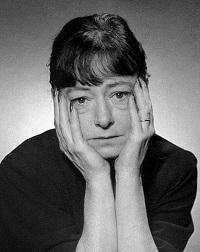 Dorothy Parker
Dorothy Parker
1893-1967
Dorothy Rothschild, journalist, writer and poet, was born on August 22, 1893, in West End, New Jersey. Parker was a legendary literary figure, known for her biting wit. She worked on such magazines as Vogue and Vanity Fair during the late 1910s. Parker went on to work as a book reviewer for The New Yorker in the 1920s. A selection of her reviews for this magazine was published in 1970 as Constant Reader, the title of her column. She remained a contributor to The New Yorker for many years; the magazine also published a number of her short stories. One of her most popular stories, “Big Blonde,” won the O. Henry Award in 1929.
In addition to her writing, Dorothy Parker was a noted member of the New York literary scene in 1920s. She formed a group called the Algonquin Round Table with writer Robert Benchley and playwright Robert Sherwood. This artistic crowd also included such members as The New Yorker founder Harold Ross, comedian Harpo Marx and playwright Edna Ferber, among others. The group took its name from its meeting place – the Algonquin Hotel – but was also known as “The Vicious Circle” for the number of cutting remarks made by its members and their habit of engaging in sharp-tongued banter.
During the 1930s and 1940s, Parker spent much of her time in Hollywood, California. She wrote screenplays with her second husband, Alan Campbell, including the 1937 adaptation of A Star Is Born and the 1942 Alfred Hitchcock film, Saboteur. In her personal life, she had become politically active, supporting such causes as the fight for civil rights. She also was involved with the Communist Party in the 1930s. It was this association that led to her being blacklisted in Hollywood.
While her opportunities in Hollywood may have dried up, Parker was still a well-regarded writer and poet. She went on to write a play, Ladies of the Corridor, in 1953. Parker returned to New York City in 1963, spending her last few years in fragile condition. She died on June 7, 1967.
Source: http://www.biography.com/people/dorothy-parker-9433450
 Bibliography
Bibliography
Press your browser’s BACK button to return to the previous page.
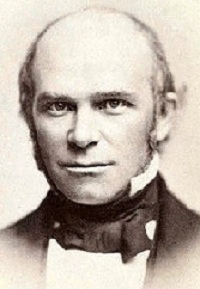 Theodore Parker
Theodore Parker
1810-1860
Theodore Parker (August 24, 1810-May 10, 1860) was an American Transcendentalist and reforming minister of the Unitarian church. A reformer and abolitionist, his own words and the quotes he popularized would later influence Abraham Lincoln and Martin Luther King Jr.
Theodore Parker was born in Lexington, Massachusetts, the youngest child in a large farming family. Most of his family had died by the time he was 27, probably due to tuberculosis. He was educated privately and through his personal study until he attended Harvard College and graduated in 1831. He then entered the Harvard Divinity School and graduated in 1836. He considered a career in law but his strong faith led him to theology.
Parker studied for a time under Convers Francis, who also preached at Parker’s ordination ceremony. In the 1830s, Parker began attending meetings of the Transcendental Club and became associated with Ralph Waldo Emerson, Amos Bronson Alcott, Orestes Brownson and several others. Unlike Emerson and other Transcendentalists, however, Parker believed the movement was rooted in deeply religious ideas and did not believe it should retreat from religion.
Parker accepted an invitation from supporters to preach in Boston in January 1845. He preached his first sermon there in February. His supporters organized the 28th Congregational Society of Boston in December and installed Parker as minister in January 1846. His congregation grew to 7,000 members.
In Boston, Parker led the movement to combat the stricter Fugitive Slave Act enacted with the Compromise of 1850. The Fugitive Slave Act required citizens of all states – free states as well as slave states – to assist in the recovery of fugitive slaves. Parker called the law “a hateful statute of kidnappers” and saw to it that violation of the law in Boston was open and organized. Parker and his followers not only refused to assist with the recovery of fugitive slaves but also helped to hide those who Southerners came to reclaim.
Parker’s ill health forced his retirement in 1859. He developed tuberculosis and departed for Florence, Italy, where he died on May 10, 1860, less than a year before the beginning of the American Civil War.
Source: http://en.wikipedia.org/wiki/Theodore_Parker
 Bibliography
Bibliography
Press your browser’s BACK button to return to the previous page.
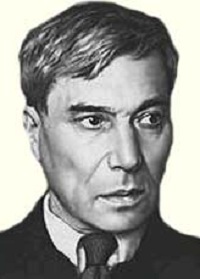 Boris Pasternak
Boris Pasternak
1890-1960
Boris Leonidovich Pasternak (February 10, 1890-May 30, 1960) was a Russian-language poet, novelist and literary translator. In his native Russia, Pasternak’s anthology, My Sister Life, is one of the most influential collections ever published in the Russian language. Furthermore, Pasternak’s theatrical translations of Goethe, Schiller, Pedro Calderon de la Barca and William Shakespeare remain deeply popular with Russian audiences.
Outside Russia, Pasternak is best known for authoring Doctor Zhivago, a novel that spans the last years of Czarist Russia and the earliest days of the Soviet Union. Banned in the USSR, Doctor Zhivago was smuggled to Milan and published in 1957. Pasternak was awarded the Nobel Prize for Literature the following year, an event that both humiliated and enraged the Communist Party of the Soviet Union. In the midst of a massive campaign against him by both the KGB and the Union of Soviet Writers, Pasternak reluctantly agreed to decline the prize. In his resignation letter to the Nobel Committee, Pasternak stated the reaction of the Soviet State was the only reason for his decision.
By the time of his death from lung cancer in 1960, the campaign against Pasternak had severely damaged the international credibility of the U.S.S.R.
Source: http://en.wikipedia.org/wiki/Boris_Pasternak
 Bibliography
Bibliography
Press your browser’s BACK button to return to the previous page.
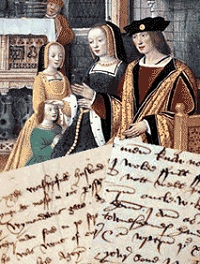 The Paston Letters
The Paston Letters
1422-1509
The Paston Letters are an invaluable collection of letters and papers, consisting of the correspondence of members of the Paston family and others connected with them between the years 1422 and 1509, and also including some state papers and other important documents.
The bulk of the letters and papers were sold by William Paston, 2nd Earl of Yarmouth, the last representative of the family, to the antiquary Peter Le Neve early in the 18th century. On Le Neve’s death in 1729, they came into the possession of Thomas Martin of Palgrave, who married Le Neve’s widow; upon Martin’s death in 1771, they were purchased by John Worth, a chemist at Diss, whose executors sold them three years later to John Fenn of East Dereham. In 1787, Fenn published a selection of the letters in two volumes and general interest was aroused. In 1789, Fenn published two other volumes of letters and, when he died in 1794, he had prepared for the press a fifth volume that was published in 1823 by his nephew, Serjeant Frere. In 1787, Fenn had received a knighthood and, on this occasion, on May 23, he presented the originals of his first two volumes to King George III. These manuscripts soon disappeared and the same fate attended the originals of the three other volumes.
The family of Paston takes its name from a Norfolk village about 20 miles north of Norwich. The first member of the family about whom anything is known was living in this village early in the 15th century. This was one Clement Paston (d. 1419), a peasant holding and cultivating about 100 acres of land, who gave an excellent education to his son, William, and enabled him to study law. Making good use of his opportunities, William Paston (1378-1444), described as “a right cunning man in the law,” attained an influential position in his profession and, in 1429, became a Justice of the Common Pleas. He bought a good deal of land in Norfolk, including some in Paston. Consequently, when he died he left a large and valuable inheritance to John Paston (1421-1466), the eldest of his five sons.
The perturbed state of affairs revealed by the Paston Letters reflects the general condition of England during the period. It was a time of trouble: The weakness of the government had disorganized every branch of the administration; the succession to the crown itself was contested; the great nobles lived in a state of civil war; and the prevailing discontent found expression in the rising of Jack Cade and in the Wars of the Roses.
The correspondence reveals the Pastons in a great variety of relations to their neighbors, friendly or hostile, and abounds with illustrations of the course of public events, as well as of the manners and morals of the time. Nothing is more remarkable than the habitual acquaintance of educated persons, both men and women, with the law, which was evidently indispensable to persons of substance.
Source: http://www.luminarium.org/medlit/pastonletters.htm
 Bibliography
Bibliography
Press your browser’s BACK button to return to the previous page.
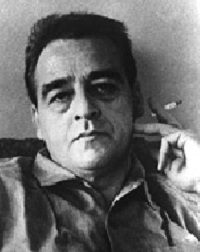 Kenneth Patchen
Kenneth Patchen
1911-1972
Kenneth Patchen was born in Niles, Ohio, on December 13, 1911. A poor boy throughout his childhood, he spent his time playing football and working in a factory. He enjoyed publishing in his school newspaper, kept a diary from the age of 12 and began reading Homer, Dante, Shakespeare, Robert Burns and Herman Melville.
After high school, he moved to Wisconsin and attended Alexander Meiklejohn’s Experimental College for one year and then the University of Wisconsin. Around this time, Patchen published a sonnet, “Permanence,” in The New York Times. He continued his education in Arkansas and then spent years traveling. He was employed as a migrant worker in a variety of jobs in the United States and Canada. Patchen published his first book of verse, Before the Brave, in 1936.
Over the course of his career, he wrote more than 40 books of poetry, prose and drama, including Bury Them in God and First Will and Testament (both in 1939), The Journal of Albion Moonlight (1941), The Dark Kingdom (published in a limited edition of 75 copies with individually painted covers) and The Teeth of the Lion (both in 1942), Sleepers Awake (1946), To Say if You Love Someone (1948), Poemscapes (1958) and But Even So: Picture Poems (1968).
Patchen was also interested in collaboration and multi-media experimentation. With the composer John Cage, he created the radio play, The City Wears a Slouch Hat (broadcast in 1942) and, in 1957, he performed with the Chamber Jazz Sextet, helping to further Jazz poetry.
For more than 30 years, Patchen lived with a severe spinal ailment that caused him almost constant physical pain. An operation in the early 1950s, thanks to a fund set up by his fellow poets – including T.S. Eliot, William Carlos Williams and E.E. Cummings – allowed him to regain his mobility, but the relief was short-lived: A mistake during a followup surgery in 1959 left him almost completely bedridden for the remaining 13 years of his life.
In 1967, the National Foundation on the Arts and Humanities presented Patchen with an award for a “lifelong contribution to American letters.” He died while living in California in 1972.
Source: http://www.poets.org/poet.php/prmPID/23
 Bibliography
Bibliography
Press your browser’s BACK button to return to the previous page.
 Ann Patchett
Ann Patchett
1963-
Ann Patchett (born December 2, 1963) is an American author. She is the recipient of a Guggenheim Fellowship and received the Nashville Banner Tennessee Writer of the Year Award in 1994.
Patchett was born in Los Angeles, California. Her mother is the novelist Jeanne Ray. She moved to Nashville, Tennessee, when she was six, where she continues to live.
Patchett attended high school at St. Bernard Academy, a private, non-parochial Catholic school for girls run by the Sisters of Mercy. Following graduation, she attended Sarah Lawrence College and took fiction writing classes. She later attended the Iowa Writers’ Workshop at the University of Iowa and the Fine Arts Work Center in Provincetown, Massachusetts. It was there that she wrote her first novel, The Patron Saint of Liars.
Patchett’s first published work was in The Paris Review, where she published a story before she graduated from Sarah Lawrence College. For nine years, Patchett worked at Seventeen magazine. Patchett has written for numerous publications, including The New York Times Magazine, The Washington Post, O, The Oprah Magazine, ELLE, GQ, Gourmet and Vogue.
In 1992, Patchett published The Patron Saint of Liars. Her second novel, Taft, won the Janet Heidinger Kafka Prize in fiction in 1994. Her third novel, The Magician’s Assistant, was released in 1997. In 2001, her fourth novel, Bel Canto, was a National Book Critics Circle Award Finalist and won the PEN/Faulkner Award.
Patchett’s novel, Run, was released in October 2007. “What Now?,” published in April 2008, is an essay based on a commencement speech she delivered at her alma mater in 2006.
Patchett is the editor of the 2006 volume of the anthology series, The Best American Short Stories. In 2011, she published State of Wonder, a novel set in the Amazon jungle.
Source: http://en.wikipedia.org/wiki/Ann_Patchett
 Bibliography
Bibliography
Press your browser’s BACK button to return to the previous page.
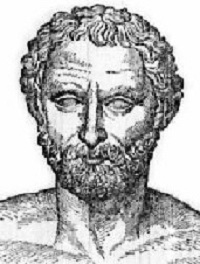 Marcus Velleius Paterculus
Marcus Velleius Paterculus
c. 19 BC-c. 31 AD
Marcus Velleius Paterculus (c. 19 BC-c. 31 AD) was a Roman historian, also known simply as Velleius. Although his praenomen is given as Marcus by Priscian, some modern scholars identify him with Gaius Velleius Paterculus, whose name occurs in an inscription on a north African milestone.
Paterculus belonged to a distinguished Campanian family and entered the army at an early age. He served as military tribune in Thrace, Macedonia, Greece and the East and, in 2 AD, was present at the interview on the Euphrates between Gaius Caesar, grandson of Augustus, and the Parthian king, Phraataces. Afterward, as praefect of cavalry and legatus, he served for eight years (from 4 AD) in Germany and Pannonia under Tiberius. For his services, he was rewarded with the quaestorship in 8 AD and, together with his brother, with the praetorship in 15 AD. He was still alive in 30 AD because his history contains many references to the consulship of M. Vinicius in that year. It has been conjectured that he was put to death in 31 AD as a friend of Sejanus, whom he praises.
His Compendium of Roman History consists of two books dedicated to M. Vinicius and covers the period from the dispersion of the Greeks after the siege of Troy down to the death of Livia (29 AD). The first book brings the history down to the destruction of Carthage, 146 BC; portions of it are missing, including the beginning. The later history, especially the period from the death of Caesar, 44 BC, to the death of Augustus, 14 AD, is treated in much greater detail. Brief notices are given of Greek and Roman literature, but no mention is made of Plautus, Horace or Propertius. He purposed to write a fuller history of the later period, including the civil war between Caesar and Pompey and the wars of Tiberius, but there is no evidence that he did so. His chief authorities were Cato’s Origines, the Annales of Q Hortensius, Pompeius Trogus, Cornelius Nepos and Livy.
Velleius Paterculus was little known in antiquity. He seems to have been read by Lucan and imitated by Sulpicius Severus, but he is mentioned only by the scholars of Lucan and once by Priscian.
Source: http://en.wikipedia.org/wiki/Marcus_Velleius_Paterculus
 Bibliography
Bibliography
Press your browser’s BACK button to return to the previous page.
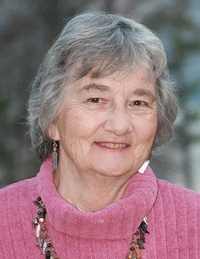 Katherine Paterson
Katherine Paterson
1932-
Born in 1932 in China to missionary parents, Katherine was herself a teacher and a missionary in Japan. She received master’s degrees in English Bible and Religious Education, and her husband is a Presbyterian minister. They have four children and seven grandchildren.
Paterson, among the most celebrated authors, has written more than 30 books for children, including 14 novels for young people. Two of these novels, The Master Puppeteer and The Great Gilly Hopkins, were National Book Award winners, in 1977 and 1979, respectively. The Great Gilly Hopkins was also the single Honor Book for the 1979 Newbery Medal. She received the Newbery Medal in 1978 for Bridge to Terabithia and, again, in 1981 for Jacob Have I Loved. Lyddie was the U.S. contribution to the Honors List of the International Board of Books for Young People in 1994, and Jip, His Story, was the winner of the 1997 Scott O’Dell Award for Historical Fiction.
Her books have been published in more than 25 languages and she is the 1998 recipient of the most distinguished international award given to a writer for a contribution to children’s literature, the Hans Christian Andersen Award.
Her most recent books are a novel, The Same Stuff as Stars, and a picture book, Blueberries for the Queen, which she co-authored with her husband, John.
Paterson lives in Vermont, the setting for the last few chapters of Long Road Home.
Source: https://en.wikipedia.org/wiki/Katherine_Paterson
 Bibliography
Bibliography
Press your browser’s BACK button to return to the previous page.
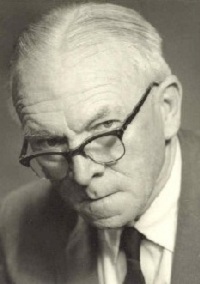 Alan Paton
Alan Paton
1903-1988
Alan Stewart Paton (January 11, 1903-April 12, 1988) was a South African author and anti-apartheid activist.
Paton was born in Pietermaritzburg, Natal Province, the son of a minor civil servant. After attending Maritzburg College, he earned a bachelor of science degree at the University of Natal in his hometown, followed by a diploma in education. After graduation, Paton worked as a teacher, first at the Ixopo High School and, subsequently, at a Maritzburg College.
After the publishing of multiple books in 1950, Paton was moved from lower-class life to middle-upper-class off the wealth of his books.
Paton volunteered for service during World War II but was refused. After the war, he took a trip, at his own expense, to tour correctional facilities across the world. He toured Scandinavia, England, continental Europe and the United States. During his time in Norway, he began work on his seminal novel, Cry, the Beloved Country, which he would complete over the course of his journey, finishing it on Christmas Eve in San Francisco in 1946.
Paton’s second and third novels, Too Late the Phalarope (1953) and Ah, but Your Land Is Beautiful (1981), and his collection of short stories, Tales from a Troubled Land (1961), all deal with the same racial themes that concerned the author in his first novel.
Paton was a prolific essay writer, his theme once again being the race and politics of South Africa. In “Save the Beloved Country,” Paton plays on the famous title of his first novel but keeps a serious tone throughout, discussing many of the famous personalities and issues on various sides of the South Africa’s apartheid struggle. Paton wrote two autobiographies: Towards the Mountain deals with Paton’s life leading up to and including the publication of Cry, the Beloved Country (an event that changed the course of his life), while Journey Continued takes its departure from that time onward. He wrote biographies of others as well.
Two recent publications of Paton’s work include travel writing – The Lost City of the Kalahari (2006) and a new complete selection of his shorter writings, The Hero of Currie Road.
Source: http://en.wikipedia.org/wiki/Alan_Paton
 Bibliography
Bibliography
Press your browser’s BACK button to return to the previous page.
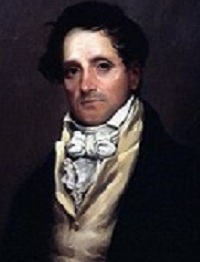 James Kirke Paulding
James Kirke Paulding
1778-1860
James Kirke Paulding (August 22, 1778-April 6, 1860) was an American writer and, for a time, the U.S. Secretary of the Navy. Paulding was born in the state of New York. He was chiefly self-educated.
He became a close friend of Washington Irving. With Irving, Paulding proposed a literary project. As he described, “one day in a frolicsome mood, we broached the idea of a little periodical merely for our own amusement, and that of the town, for neither of us anticipated any further circulation.” The result was Salmagundi – a continuation of which by himself proved a failure.
Along with Irving, Paulding was associated with the “Knickerbocker group,” which also included William Cullen Bryant, Gulian Crommelin Verplanck, Fitz-Greene Halleck, Joseph Rodman Drake, Robert Charles Sands, Lydia Maria Child and Nathaniel Parker Willis.
Paulding’s other writings include: The Diverting History of John Bull and Brother Jonathan (1812), a satire; The Dutchman’s Fireside (1831), a popular romance; a Life of Washington (1835); and some poems. In the decade before Washington Irving and James Fenimore Cooper achieved popular success, Paulding experimented in every genre in an effort to forge a new American literature. Thereafter, his outstanding contributions were in the novel and in a stage comedy.
Koningsmarke (1823), which he began as a spoof of Walter Scott’s historical romances, took unexpected hold of his imagination and became a well-turned novel, notable for its portrait of an old black woman that anticipates William Faulkner and for its sympathetic yet unromanticized depiction of the Indian. Lion of the West, selected in a play competition in which William Cullen Bryant was one of the judges, presented a cartoon of Davy Crockett; it was the most-performed play on the American stage before Uncle Tom’s Cabin and an altered version enjoyed success in London. Paulding’s “View of Slavery in the United States” (1836) was a comprehensive defense of both black slavery and America’s claim to be a bastion of liberty against the attacks of abolitionists and European critics.
Among Paulding’s government positions were those of secretary to the Board of Navy Commissioners in 1815-23 and Naval Agent in New York in 1824-38. President Martin Van Buren appointed him Secretary of the Navy in June 1838. As Secretary, he was a conservative figure whose extensive knowledge of naval affairs was balanced by notable lack of enthusiasm for new technology. He opposed the introduction of steam-propelled warships declaring that he would “never consent to let our old ships perish and transform our Navy into a fleet of (steam) sea monsters.” Nevertheless, his tenure was marked by advances in steam engineering, wide-ranging exploration efforts, enlargement of the fleet and an expansion of the Navy’s apprenticeship program.
Paulding left office with the change of administrations in March 1841, returned to literary pursuits and took up agriculture. He died at his farm near Hyde Park, New York.
Source: http://en.wikipedia.org/wiki/James_Kirke_Paulding
 Bibliography
Bibliography
Press your browser’s BACK button to return to the previous page.
 Gary Paulsen
Gary Paulsen
1939-2021
Gary Paulsen was born in Minneapolis, Minnesota, a few months before World War II began to sweep across Europe. It is no surprise, therefore, that the future writer’s early life was shaped by the war. His father, Oscar, an Army officer, was eventually sent to Europe, where he served under General George Patton. Paulsen’s mother, Eunice, moved with her son to Chicago, where she worked in a munitions factory.
After the war, his father was stationed in the Philippines. In 1946, Paulsen and his mother crossed the Pacific Ocean on a troop ship to join him in Manila. A terrifying incident occurred during the voyage: Paulsen and his mother witnessed a plane crash into the sea – and watched in horror as the passengers were torn apart by sharks.
Life in the Philippines was not very happy, either. Paulsen describes his parents’ alcoholism and his difficult childhood there in the autobiographical, Eastern Sun, Winter Moon.
After returning to the United States in 1949, the Paulsens never stayed in the same place for long. He never spent more than five months in the same school and was very unhappy in school because he was shy and awkward. One freezing winter’s day, however, with nothing to do, Paulsen walked into a library to warm up. He walked out with a library card and a book – and the beginning of a lifelong love of reading.
Paulsen’s restless lifestyle continued when he became an adult. Among the jobs he held were teacher, soldier, farmer, trapper, professional archer and singer. A constant factor in Paulsen’s life was his love of reading. Then, in 1966, he began to write. He completed more than 100 books. He wrote for children and for adults; he wrote fiction, nonfiction and even drama. Many of Paulsen’s books, especially his nonfiction, reflected his varied jobs and interests. He wrote about rodeos, football, hiking, basketball, canoeing and kayaking, skiing, hockey, ballooning, tennis, sailing, building a home, home repairs and farming.
Paulsen also loved dog-sled racing. He took part in the Iditarod, the 1,200-mile dog-sled race across Alaska, in 1983 and again in 1985. In Winterdance: The Fine Madness of Running the Iditarod, he described training for and running one of the races; how he was dragged part of the way by his dogs; how he nearly froze, nearly drowned and nearly plunged over a cliff to his death; how he encountered blizzards, enraged moose and crazed racers. Only a doctor’s diagnosis that he had serious heart disease stopped him from a third attempt.
Paulsen’s love for adventure also is reflected in many of his novels. Dogsong, for example, describes a boy’s journey across Alaska by dog sled. Hatchet, too, is an adventure story, a tale that pits a boy who knows nothing about life in the wilderness against the forces of nature.
Paulsen died from cardiac arrest at his home in Tularosa, New Mexico on October 13, 2021, aged 82.
Source: https://en.wikipedia.org/wiki/Gary_Paulsen
 Bibliography
Bibliography
Press your browser’s BACK button to return to the previous page.
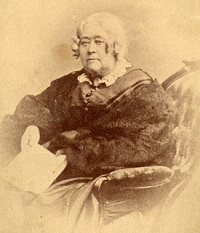 Elizabeth Palmer Peabody
Elizabeth Palmer Peabody
1804-1894
Elizabeth Palmer Peabody (May 16, 1804-January 3, 1894) was an American educator who opened the first English-language kindergarten in the United States. Long before most educators, Peabody embraced the premise that children’s play has intrinsic developmental and educational value.
Peabody was born in Billerica, Massachusetts. She was the daughter of Nathaniel Peabody, a physician, and spent her early years in Salem. After 1822, she resided principally in Boston, where she worked as a teacher. She also became a writer and a prominent figure in the Transcendental movement. During 1834-1835, she worked as assistant teacher to Amos Bronson Alcott at his experimental Temple School in Boston. After the school closed, Peabody published Record of a School, outlining the plan of the school and Alcott’s philosophy of early childhood education, which had drawn on German models.
She later opened a book store, Elizabeth Palmer Peabody’s West Street Bookstore, at her home in Boston (c. 1840-1852).
It was there that the “Conversations” were held, organized by Margaret Fuller. The first of these meetings between women was conducted on November 6, 1839. Topics for these discussions and debates varied but subjects were as diverse as fine arts, history, mythology, literature and nature. Fuller served as the “nucleus of conversation” and hoped to answer the “great questions” facing women: “What were we born to do? How shall we do it? which so few ever propose to themselves ’till their best years are gone by.” Many figures in the women’s rights movement took part, including Sophia Dana Ripley, Caroline Sturgis and Maria White Lowell.
For a time, Peabody was the business manager of The Dial, the main publication of the Transcendentalists. In 1843, she noted that the journal’s income was not covering the cost of printing and that subscriptions totaled just more than 200. The publication ceased shortly thereafter in April 1844.
When Peabody opened her kindergarten in 1860, the practice of providing formal schooling for children younger than six was largely confined to Germany. She had a particular interest in the educational methods of Friedrich Frobel and, in 1867, visited Germany for the purpose of studying them more closely. Through her own kindergarten, and as editor of The Kindergarten Messenger (1873-1877), Peabody helped establish kindergarten as an accepted institution in American education.
Peabody died on January 3, 1894, aged 89. She is buried at Sleepy Hollow Cemetery in Concord, Massachusetts.
Source: http://en.wikipedia.org/wiki/Elizabeth_Peabody
 Bibliography
Bibliography
Press your browser’s BACK button to return to the previous page.
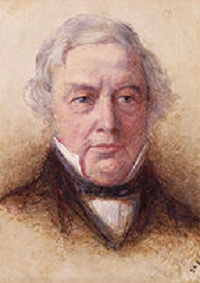 Thomas Love Peacock
Thomas Love Peacock
1785-1866
Thomas Love Peacock (October 18, 1785-January 23, 1866) was an English novelist, poet and official of the East India Company. He was a close friend of Percy Bysshe Shelley and they influenced each other’s work. Peacock wrote satirical novels, each with the same basic setting – characters at a table discussing and criticizing the philosophical opinions of the day.
Peacock was born in Weymouth, Dorset, the son of Samuel Peacock and his wife, Sarah Love, daughter of Thomas Love. His first known poems were an epitaph for a school fellow, written at the age of 10, and another on his midsummer holidays, written when he was 13. Around that time, in 1798, he was abruptly taken from school and from then on was entirely self-educated.
In February 1800, Peacock became a clerk with Ludlow Fraser Company, merchants in the City of London. He won the 11th prize from The Monthly Preceptor for a verse answer to the question, “Is History or Biography the More Improving Study?” He also contributed to The Juvenile Library, a magazine for youth. In 1804 and 1806, he published two volumes of poetry, The Monks of St. Mark and Palmyra.
In the autumn of 1808, he became private secretary to Sir Home Popham, commanding the fleet before Flushing. By the end of the year, he was serving Captain Andrew King aboard HMS Venerable in the Downs. His preconceived affection for the sea did not reconcile him to nautical realities. His dramatic taste for the next nine years resulted in attempts at comedies and lighter pieces, all of which lacked ease of dialogue and over-elaborated incident and humor. He left HMS Venerable in March 1809.
In 1812, Peacock published another elaborate poem, “The Philosophy of Melancholy.” In 1814, Peacock published a satirical ballad, “Sir Proteus,” which appeared under the pseudonym “P. M. O’Donovan, Esq.” He wrote Headlong Hall in 1815 and it was published the following year. With this work, Peacock found the true field for his literary gift in the satiric novel, interspersed with delightful lyrics, amorous, narrative or convivial.
Peacock retired from the India House on March 29, 1856, with an ample pension. In his retirement, he still showed vigor by the publication in Fraser’s Magazine of Gryll Grange, his last novel. His last writings were two translations – Gl’ Ingannati (The Deceived), a comedy performed at Siena in 1861, and Aelia Laelia Crispis, of which a limited edition was circulated in 1862.
Peacock died at Lower Halliford on January 23, 1866, from injuries sustained in a fire in which he had attempted to save his library. He was buried in the new cemetery at Shepperton.
Source: http://en.wikipedia.org/wiki/Thomas_Love_Peacock
 Bibliography
Bibliography
Press your browser’s BACK button to return to the previous page.
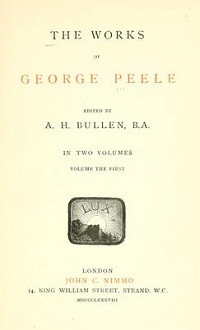 George Peele
George Peele
1558-1596
George Peele (July 25, 1556-November 9, 1596) was an English dramatist.
Peele was christened on July 25, 1556. His father, who appears to have belonged to a Devonshire family, was clerk of Christ’s Hospital and wrote two treatises on bookkeeping. Peele was educated at Christ’s Hospital and entered Broadgates Hall (Pembroke College), Oxford, in 1571. In 1574, he removed to Christ Church, taking his B.A. degree in 1577 and his M.A. in 1579. He went up to London about 1580 but, in 1583, when Albertus Alasco (Albert Laski), a Polish nobleman, was entertained at Christ Church, Peele was entrusted with the arrangement of two Latin plays by William Gager (1580-1619) that were presented on the occasion.
In 1585, he was employed to write The Device of the Pageant borne before Woolston Dixie and, in 1591, he devised the pageant in honor of another Lord Mayor, Sir William Webbe. This was the Descensus Astraeae (printed in the Harleian Miscellany, 1808), in which Queen Elizabeth is honored as “Astraea.”
His pastoral comedy, The Arraignment of Paris, was presented by the Children of the Chapel Royal before Queen Elizabeth, perhaps as early as 1581, and was printed anonymously in 1584. His play, Edward I, was printed in 1593. Peele is said by some scholars to have written or contributed to the bloody tragedy, Titus Andronicus, which was published as the work of Shakespeare. This theory is in part due to Peele’s predilection for gore, as evidenced in The Battle of Alcazar (acted 1588-1589, printed 1594), published anonymously, which is attributed with much probability to him. The Old Wives’ Tale (1595) was followed by The Love of King David and Fair Bethsabe (written c. 1588, printed 1599).
Other plays attributed to Peele include: Jack Straw (c. 1587), The Wisdom of Dr. Doddypoll (printed 1600), The Maid’s Metamorphosis (printed 1600) and Wily Beguiled (printed 1606). Among his occasional poems are: “The Honour of the Garter” and “Polyhymnia” (1590). To The Phoenix Nest in 1593 he contributed “The Praise of Chastity.”
Peele died “of the pox,” according to Francis Meres, and was buried on November 9, 1596. One of the eight boarding houses at the Horsham campus is now named Peele after George Peele and as a commemoration to the work of the Peele family with the ancient foundation of the Christ’s Hospital School.
Source: http://en.wikipedia.org/wiki/George_Peele
 Bibliography
Bibliography
Press your browser’s BACK button to return to the previous page.
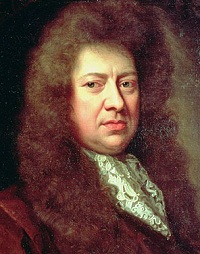 Samuel Pepys
Samuel Pepys
1633-1703
Samuel Pepys was born on February 23, 1633, the son of a London tailor and fifth of 11 children. He first attended the Huntingdon Free School and then St. Paul’s School. He entered Trinity College, Cambridge, in 1650, but shortly transferred to Magdalene College, Cambridge, graduating B.A. in 1653.
In 1654, Pepys became secretary to Sir Edward Montagu, later Earl of Sandwich, a distant relative. Soon after, Pepys became a clerk of the Exchequer and married Elizabeth St. Michel in 1655. In 1660, Pepys was made Clerk of the King’s Ships to the Navy Board.
On January 1, 1660, at the age of 27, Pepys began his Diary. It was written in the shorthand system established by Thomas Shelton and covered nine years – not only of Pepys’ life, but of London events. The passages on the plague (1665-1666), the Great Fire of London (1666) and the arrival of the Dutch fleet (1665-1667) are invaluable firsthand accounts to historians.
Pepys stopped writing his diary in the spring of 1669 – at the age of 36, his eyesight had gotten worse and he feared losing his sight altogether. The following 34 years brought him more appointments and acclaim. Pepys became a Member of Parliament and Secretary of the Admiralty in 1673, and took part in organizing the navy during the war with the Dutch in 1672-74. In 1679, Pepys was accused of giving naval secrets to the French in the Popish Plot and was imprisoned in the Tower for six weeks. Pepys was soon cleared of charges, however, and was reinstated as Secretary to the Admiralty in 1684. He served as president of the Royal Society from 1684-86 and retired from public service in 1689 at the accession of King William III.
In 1690, Pepys published his Memoirs … of the Royal Navy. After this, Pepys spent most of his time building and cataloging a library of his own. In 1701, when his health began to fail, he moved to Clampham, where he completed his collection of 3,000 books.
When Pepys died on May 26, 1703, his library, including his Diary, was bequeathed to his nephew, John Jackson, and subsequently to Magdalen College – under the condition that the contents would never be altered. Samuel Pepys was laid to rest in St. Olave’s Church, Hart Street. The Diary was first partially deciphered in 1819 and published in 1825.
Source: http://www.luminarium.org/eightlit/pepys/pepysbio.htm
 Bibliography
Bibliography
Press your browser’s BACK button to return to the previous page.
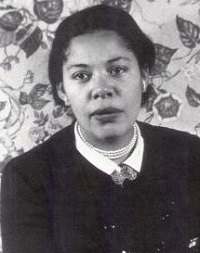 Ann Petry
Ann Petry
1908-1997
Ann Petry (October 12, 1908-April 28, 1997) was an American author who became the first Black woman writer with book sales topping a million copies for her novel, The Street.
Born Ann Lane in Old Saybrook, Connecticut, she was the youngest of three daughters to Peter Clark Lane and Bertha James Lane. Her parents belonged to the Black minority of the small town. Her father was a pharmacist and her mother was a shop owner, chiropodist and hairdresser.
The wish to become a professional writer was raised in Petry for the first time in high school when her English teacher read her essay to the class, commenting on it with the words: “I honestly believe that you could be a writer if you wanted to.” The decision to become a pharmacist was her family’s. She enrolled in college and graduated with a Ph.D degree from Connecticut College of Pharmacy in New Haven in 1931 and worked in the family business for several years. She also began to write short stories while she was working at the pharmacy.
On February 22, 1938, she married George D. Petry of New Iberia, Louisiana, which brought her to New York. She not only wrote articles for newspapers such as The Amsterdam News, or The People’s Voice, and published short stories in The Crisis, but also worked at an after-school program at P.S. 10 in Harlem. It was during this period of her life that she realized and personally experienced what the majority of the Black population of the United States had to go through in everyday life.
Traversing the streets of Harlem, living for the first time among large numbers of poor Black people, seeing neglected children up close made impressions on her. Impacted by her Harlem experiences, Petry used her creative writing skills to bring this experience to paper.
Petry’s most popular novel, The Street, was published in 1946 and won the Houghton-Mifflin Literary Fellowship. Back in Old Saybrook in 1947, the writer worked on Country Place (1947), The Narrows (1953), other stories and books for children, but they never achieved the same success as her first book. Until her death, Petry lived in an 18th century house in her hometown, Old Saybrook.
Ann Lane Petry died at the age of 88 on April 28, 1997.
Source: http://en.wikipedia.org/wiki/Ann_Petry
 Bibliography
Bibliography
Press your browser’s BACK button to return to the previous page.
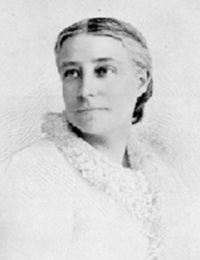 Elizabeth Stuart Phelps
Elizabeth Stuart Phelps
1844-1911
Elizabeth Stuart Phelps Ward, born Mary Gray Phelps, (August 31, 1844-January 28, 1911) was an American author. She was born at Andover, Massachusetts. In most of her writings, she used her mother’s name, Elizabeth Stuart Phelps, as a pseudonym, both before and after her marriage in 1888 to Herbert Dickinson Ward, a journalist 17 years her junior. She also used the pseudonym Mary Adams. Her father, Austin Phelps, was pastor of the Pine Street Congregational Church until 1848, when he accepted a position as the Chair of Rhetoric at Andover Theological Seminary and moved the family to Boston.
Ward wrote three Spiritualist novels – The Gates Ajar, Between the Gates and Beyond the Gates – and a novella about animal rights, Loveliness. While writing other popular stories, she was also a great advocate, by lecturing and otherwise, for social reform, temperance and the emancipation of women. She was also involved in clothing reform for women, urging them to burn their corsets in 1874.
Elizabeth Stuart Phelps and her husband co-authored two Biblical romances in 1890 and 1891. Her autobiography, Chapters from a Life, was published in 1896 after being serialized in McClure’s. She also wrote a large number of essays for Harper’s.
Phelps continued to write short stories and novels into the 20th century. One work, Trixy (1904), dealt with another cause she supported, anti-vivisection (a topic on which she also addressed the Massachusetts State Legislature). Her last work, Comrades (1911), was published posthumously. Phelps died on January 28, 1911, in Newton Center, Massachusetts.
Source: http://en.wikipedia.org/wiki/Elizabeth_Stuart_Phelps_Ward
 Bibliography
Bibliography
Press your browser’s BACK button to return to the previous page.
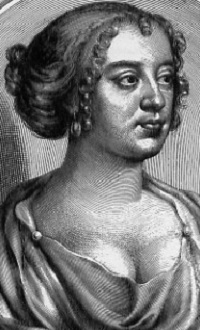 Katherine Philips
Katherine Philips
1631-1664
Katherine Fowler was born on January 1, 1631, in London, England. Her father, John Fowler, was a Presbyterian merchant. Katherine was educated at one of the Hackney boarding-schools, institutions whose students were admired more for their beauty than their academic achievements, where she became fluent in several languages. After the death of John Fowler, Katherine’s mother married a Welshman, Hector Philips and, in 1647, at the age of 16, Katherine was married to 54-year old James Philips, Hector’s son by his first wife.
In spite of the difference in their ages, there appears to have been little conflict between Katherine and James although, politically, she was a Royalist and he supported Oliver Cromwell. This difference in their views is recorded in Katherine’s poetry. However, James continued to reside on the coast of Wales, while his wife spent much of her time in London. He encouraged her literary activities and left her largely to her own devices.
Her time was not idly spent. Besides bearing two children, Philips founded The Society of Friendship, wrote some 116 poems, completed five verse translations and translated two plays by Pierre Corneille (1606-1684) from the French. The earlier of these dramatic translations, a rendering of Pompey, was produced in 1663, the first play by a woman to be performed on the London stage. It was also performed, to great acclaim, in Dublin in the same year. The later translation, Horace, was not finished in her lifetime. Sir John Denham (1615-1669) completed her work and the play was produced in 1668.
Philips died of smallpox on June 22, 1664, in London. She was 33 years old. Her death was mourned in verse by the metaphysical poet, Abraham Cowley. The first authorized collection of her verse was not published until 1667.
Source: http://www.usask.ca/english/phoenix/philipsbio.htm
 Bibliography
Bibliography
Press your browser’s BACK button to return to the previous page.
 Caryl Phillips
Caryl Phillips
1958-
Caryl Phillips was born on March 13, 1958, on the Caribbean island of St Kitts. He grew up in Leeds, England, and read English at Queen’s College, Oxford. He is the author of six novels, several books of nonfiction and has written for film, theatre, radio and television. Much of his writing – both fiction and nonfiction – has focused on the legacy of the Atlantic slave trade and its consequences for the African Diaspora.
The Final Passage (1985), his first novel, won the Malcolm X Prize for Literature. Other novels include: A State of Independence (1986); Higher Ground (1989); Cambridge (1991); Crossing the River (1993); and The Nature of Blood (1997).
His nonfiction includes a travel narrative, The European Tribe (1987), and The Atlantic Sound (2000), an account of a journey he made to three vital hubs of the Atlantic slave trade. A New World Order: Selected Essays was published in 2001; A Distant Shore was published in 2003.
He is also the editor of Extravagant Strangers (1997), a collection of writings by British writers born outside Britain, and he wrote the screenplay for the film adaptation of V.S. Naipaul’s novel, The Mystic Masseur, first screened in 2001.
He was awarded a Guggenheim Foundation Fellowship in 1992 and a Lannan Literary Award in 1994. He has taught at universities in Europe, Africa, Asia, the Caribbean and the United States, where he was Professor of English at Amherst College, Massachusetts (1994-98). Since 1998, he has been Professor of English and Henry R. Luce Professor of Migration and Social Order at Barnard College, Columbia University, New York. He became a Fellow of the Royal Society of Literature in 2000.
Phillips’ book, Dancing in the Dark (2005), a novelization of the life of Bert Williams, the American entertainer, was short-listed for a 2006 Commonwealth Writers Prize. His book, Foreigners: Three English Lives (2007), is about the lives of three Black men (Francis Barber, Randolph Turpin and David Oluwale).
His next novel was In the Falling Snow (2009).
Source: https://en.wikipedia.org/wiki/Caryl_Phillips
 Bibliography
Bibliography
Press your browser’s BACK button to return to the previous page.
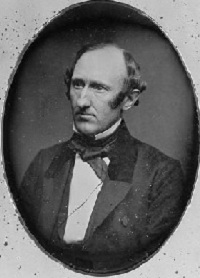 Wendell Phillips
Wendell Phillips
1811-1884
Wendell Phillips (November 29, 1811-February 2, 1884) was an American abolitionist, advocate for Native Americans and orator. He was an exceptional orator and agitator, advocate and lawyer, writer and debater.
Phillips was born in Boston, Massachusetts, to Sarah Walley and John Phillips, a successful lawyer, politician and philanthropist. Phillips was educated at Boston Latin School and graduated from Harvard University in 1831. Afterward, he went on to attend Harvard Law School, from which he graduated in 1833. In 1834, Phillips was admitted to the Massachusetts state bar and, in the same year, opened a law practice in Boston. His professor of oratory was Edward T. Channing, who criticized the flowery style of speakers such as Daniel Webster. He urged the value of plain talk, which Phillips took to heart.
After being converted to the abolitionist cause by William Lloyd Garrison in 1836, Phillips stopped practicing law in order to fully dedicate himself to the movement. He joined the American Anti-Slavery Society and frequently made speeches at its meetings. Garrison was a newspaper writer who spoke openly against the wrongs of slavery. Phillips horrified his family when he joined the Massachusetts Anti-Slavery Society and they tried to have him thrown into an insane sanitarium. So highly regarded were his oratorical abilities that he was known as “Abolition’s Golden Trumpet.” Like many of his fellow abolitionists, Phillips took pains to eat no cane sugar and wear no clothing made of cotton because both were produced by the labor of Southern slaves.
It was Phillips’ contention that racial injustice was the source of all of society’s ills. Like Garrison, Phillips denounced the Constitution for tolerating slavery. He disagreed with the argument of abolitionist Lysander Spooner that slavery was unconstitutional and, more generally, disputed Spooner’s notion that any unjust law should be held legally void by judges.
In 1854, Phillips was indicted for his participation in the celebrated attempt to rescue Anthony Burns, a captured fugitive slave, from jail in Boston.
After African-Americans gained the right to vote with the 15th Amendment in 1870, Phillips switched his attention to other issues, such as women’s rights, universal suffrage, temperance and the labor movement.
Phillips was also active in efforts to gain equal rights for Native Americans, arguing that the 14th Amendment also granted citizenship to Indians. He proposed that the Andrew Johnson administration create a cabinet-level post that would guarantee Indian rights. Phillips helped create the Massachusetts Indian Commission with Indian rights activist Helen Hunt Jackson and Massachusetts Governor William Claflin.
Although publicly critical of President Ulysses S. Grant’s drinking, he worked with Grant’s second administration on the appointment of Indian agents. Phillips lobbied against military involvement in the settling of Native American problems on the Western frontier. He accused General Philip Sheridan of pursuing a policy of Indian extermination.
Public opinion turned against Native American advocates after the Battle of the Little Bighorn in July 1876, but Phillips continued to support the land claims of the Lakota (Sioux).
Source: http://en.wikipedia.org/wiki/Wendell_Phillips
 Bibliography
Bibliography
Press your browser’s BACK button to return to the previous page.
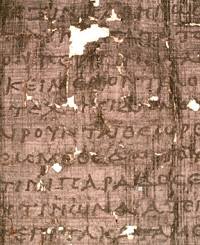 Philodemus
Philodemus
110-35 BC
Philodemus (c. 110-c. 35 BC) was an Epicurean philosopher and poet. Born in Judea, he ultimately migrated to Italy after studying and teaching in Athens. He settled at Herculaneum on the Bay of Naples, living and teaching in the mansion of his Roman patron, L. Calpurnius Piso Caesoninius, consul in 58 BC and father-in-law of Julius Caesar.
According to Cicero, he was “a person of talent and erudition,” “thoroughly versed not only in philosophy but also in the other studies which Epicureans are generally said to neglect.” Cicero praised his poems and called him “my friend, an excellent man and most learned human being.”
Philodemus’ circle was a major channel to the Romans for the ideas of Epicurus and other Hellenistic philosophers. His many pupils among the Roman intelligentsia and literati included several of Rome’s greatest poets, notably Virgil, possibly Horace and perhaps even Lucretius. His unorthodox literary theory probably influenced their practice. Philodemus dedicated his “On Virtues and Vices” to Virgil and three other avant-garde poets prominent in Augustan Rome: Plotius Tucca, Varius Rufus and Quintilius Varius. All four were close friends of Horace and are mentioned frequently in his works.
Source: http://www.utexas.edu/depts/classics/documents/Philodemus.html
 Bibliography
Bibliography
Press your browser’s BACK button to return to the previous page.
 Jodi Picoult
Jodi Picoult
1966-
Jodi Lynn Picoult (born May 19, 1966) is an American author. She was awarded the New England Bookseller Award for fiction in 2003.
Picoult was born and raised in Nesconset on Long Island; her family moved to New Hampshire when she was 13 years old. Picoult wrote her first story at age 5, “The Lobster which Misunderstood.”
She studied writing at Princeton University and graduated in 1987. She published two short stories in Seventeen magazine while still in college. Immediately after graduation, she began a variety of jobs, ranging from editing textbooks to teaching eighth-grade English. She earned a master’s degree in education from Harvard University.
Picoult became the writer of DC Comics’ Wonder Woman (vol. 3) series following the departure of fellow writer, Allan Heinberg. Her first issue (#6) was released on March 28, 2007, and her last was issue #10 (released on June 27, 2007).
Nineteen Minutes, Picoult’s novel about the aftermath of a school shooting in a small town, has become her first book to debut at No. 1 on The New York Times bestseller list. Her book, Change of Heart, was published on March 4, 2008, and became Picoult’s second novel to debut at No. 1 on The New York Times bestseller list.
Source: http://en.wikipedia.org/wiki/Jodi_Picoult
 Bibliography
Bibliography
Press your browser’s BACK button to return to the previous page.
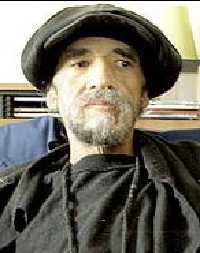 Pedro Pietri
Pedro Pietri
1944-2004
Pedro Pietri (March 21, 1944-March 3, 2004) was a Nuyorican poet and playwright who co-founded the Nuyorican Poets Cafe. He was the poet laureate of the Nuyorican Movement.
Pietri was born in Ponce, Puerto Rico, but his family moved to New York City in 1947 when he was only three years old. They settled down in the Spanish Harlem section of Manhattan, where he and his siblings received their primary and secondary education. Pietri was greatly influenced by his aunt, who often recited poetry and on occasion produced theatrical plays in the local church. Pietri himself started to write poems as a student at Haaren High School. After graduating from high school, he worked in a variety of jobs until he was drafted into the U.S. Army and sent to fight in the Vietnam War. The experiences that he faced in the Army and Vietnam, plus the discrimination that he witnessed while growing up in New York, were to become the main factors that would forge his personality and style of poetry.
Upon his discharge from the Army, Pietri affiliated himself with a Puerto Rican Civil Rights activist group called the Young Lords. In 1969, he read for the first time his most renowned poem, “Puerto Rican Obituary.” The poem, published in 1973, tells about five Puerto Ricans who travel to New York in search of a better way of life only to find hardships and suffer heartbreak.
Pietri helped found the Nuyorican Poets Cafe, together with Miguel Pinero and Miguel Algarin. The Cafe is an institution where many New York Puerto Rican and Latino artists perform. Pietri wrote the play, El Puerto Rican Embassy. The theme was that an island, which was neither an independent nation nor a state of the United States, should have an embassy. The idea for the play came from Pietri’s nationalistic views. During the performance, he would sing “The Spanglish National Anthem” and hand out simulated “Puerto Rican passports” prepared in collaboration with Adal Maldonado.
Among his other works are: Invisible Poetry (1979), Traffic (1980), Plays (1982), Traffic Violations (1983) and The Masses Are Asses (1988). His writings have been published and included in the following anthologies: Inventing a Word: An Anthology of Twentieth Century Puerto Rican Poetry (1980), Illusions of a Revolving Door (1984), The Outlaw Bible of American Poetry (1999), The Prentice Hall Anthology of Latino Literature (2002) and many others.
Pietri not only wrote poetry but also recorded it. In 1979, he came out with an LP entitled Loose Joints and, later, One Is a Crowd, both of which were produced by Folkways Records.
Pedro Pietri was diagnosed with stomach cancer in 2003. He went to Mexico to receive an alternative treatment for a year. On March 3, 2004, he died en route from Mexico to New York.
Source: http://en.wikipedia.org/wiki/Pedro_Pietri
 Bibliography
Bibliography
Press your browser’s BACK button to return to the previous page.
 Robert Pinsky
Robert Pinsky
1940-
Robert Pinsky (born October 20, 1940) is an American poet, essayist, literary critic and translator. From 1997 to 2000, he served as Poet Laureate Consultant in Poetry to the Library of Congress. Pinsky is the author of 19 books, most of which are collections of his own poetry. His published works also include critically acclaimed translations and a collection of poems by Czeslaw Milosz and Dante Alighieri. He teaches at Boston University and is the poetry editor at Slate.
Pinsky was born in Long Branch, New Jersey, where he attended Long Branch High School. He received a B.A. from Rutgers University in New Brunswick, New Jersey, and earned both an M.A. and Ph.D in Philosophy from Stanford University, where he was a Stegner Fellow in creative writing.
Pinsky wrote the libretto for Death and the Powers, a ground-breaking opera by composer Tod Machover. Pinsky is also the author of the interactive fiction game, Mindwheel (1984), developed by Synapse Software and released by Broderbund.
He now lives in Cambridge, Massachusetts, and teaches in the graduate writing program at Boston University.
Source: http://en.wikipedia.org/wiki/Robert_Pinsky
 Bibliography
Bibliography
Press your browser’s BACK button to return to the previous page.
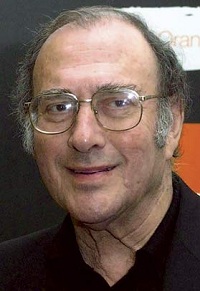 Harold Pinter
Harold Pinter
1930-2008
Harold Pinter (October 10, 1930-December 24, 2008) was a Nobel Prize-winning English playwright, screenwriter, director and actor. One of the most influential modern British dramatists, his writing career spanned more than 50 years. His best-known plays include: The Birthday Party (1957), The Homecoming (1964) and Betrayal (1978). His screenplay adaptations of others’ works include: The Servant (1963), The Go-Between (1970), The French Lieutenant’s Woman (1981), The Trial (1993) and Sleuth (2007). He also directed or acted in radio, stage, television and film productions of his own and others’ works.
Pinter was born and raised in Hackney, east London, and educated at Hackney Downs School. He was a sprinter and a keen cricket player, acting in school plays and writing poetry. He attended the Royal Academy of Dramatic Art but did not complete the course. He was fined for refusing National Service as a conscientious objector. Subsequently, he continued training at the Central School of Speech and Drama and worked in repertory theatre in Ireland and England.
Pinter’s career as a playwright began with a production of The Room in 1957. His second play, The Birthday Party, closed after eight performances but was enthusiastically reviewed. Later plays, such as No Man’s Land (1975) and Betrayal (1978), became known as “memory plays.”
He directed nearly 50 productions for stage, theatre and screen. Pinter received more than 50 awards, prizes and other honors, including the Nobel Prize in Literature in 2005 and the French Legion d’honneur in 2007.
Despite frail health after being diagnosed with esophageal cancer in December 2001, Pinter continued to act on stage and screen, last performing the title role of Samuel Beckett’s one-act monologue, Krapp’s Last Tape, for the 50th anniversary season of the Royal Court Theatre in October 2006.
He died from liver cancer on December 24, 2008.
Source: http://en.wikipedia.org/wiki/Harold_Pinter
 Bibliography
Bibliography
Press your browser’s BACK button to return to the previous page.
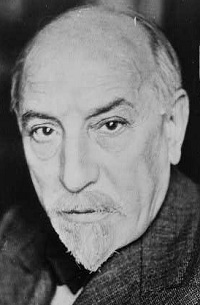 Luigi Pirandello
Luigi Pirandello
1867-1936
Luigi Pirandello (June 28, 1867-December 10, 1936) was an Italian dramatist, novelist and short story writer awarded the Nobel Prize in Literature, in 1934, for his “bold and brilliant renovation of the drama and the stage.” Pirandello’s works include novels, hundreds of short stories and about 40 plays, some of which are written in Sicilian. His tragic farces are often seen as forerunners for Theatre of the Absurd.
He died alone in his home at Via Bosio, Rome, on December 10, 1936.
Source: http://en.wikipedia.org/wiki/Luigi_Pirandello
 Bibliography
Bibliography
Press your browser’s BACK button to return to the previous page.
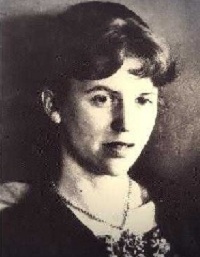 Sylvia Plath
Sylvia Plath
1932-1963
Sylvia Plath (October 27, 1932-February 11, 1963) was an American poet, novelist and short story writer. Born in Massachusetts, she studied at Smith College and Newnham College, Cambridge before receiving acclaim as a professional poet and writer. She married fellow poet Ted Hughes in 1956 and they lived together first in the United States and then England, having two children together: Frieda and Nicholas. Following a long struggle with depression and a marital separation, Plath committed suicide in 1963. Controversy continues to surround the events of her life and death, as well as her writing and legacy.
Plath is credited with advancing the genre of confessional poetry and is best known for her two published collections: The Colossus and Other Poems and Ariel. In 1982, she became the first poet to win a Pulitzer Prize posthumously, for The Collected Poems. She also wrote The Bell Jar, a semi-autobiographical novel published shortly before her death.
Dr. John Horder, a close friend who lived near Plath, prescribed Plath antidepressants a few days before her death. On February 11, 1963, Plath was found dead of carbon monoxide poisoning in the kitchen, with her head in the oven. She was 30.
Source: http://en.wikipedia.org/wiki/Sylvia_Plath
 Bibliography
Bibliography
Press your browser’s BACK button to return to the previous page.
 Plato
Plato
424/423 BC-348/347 BC
Plato (424/423 BC-348/347 BC), was a Classical Greek philosopher, mathematician, student of Socrates, writer of philosophical dialogues and founder of the Academy in Athens, the first institution of higher learning in the Western world. Along with his mentor, Socrates, and his student, Aristotle, Plato helped to lay the foundations of Western philosophy and science.
Plato’s sophistication as a writer is evident in his Socratic dialogues; 36 dialogues and 13 letters have been ascribed to him. Plato’s writings have been published in several fashions; this has led to several conventions regarding the naming and referencing of Plato’s texts.
Plato’s dialogues have been used to teach a range of subjects, including philosophy, logic, ethics, rhetoric and mathematics.
A variety of sources have given accounts of Plato’s death. One story, based on a mutilated manuscript, suggests Plato died in his bed, while a young Thracian girl played the flute to him. Another tradition suggests Plato died at a wedding feast. According to Tertullian, Plato simply died in his sleep.
Source: http://en.wikipedia.org/wiki/Plato
 Bibliography
Bibliography
Press your browser’s BACK button to return to the previous page.
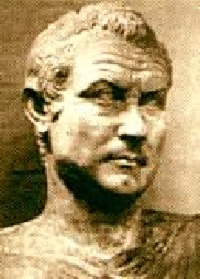 Titus Maccius Plautus
Titus Maccius Plautus
c. 254-184 BC
Titus Maccius Plautus (c. 254-184 BC), commonly known as “Plautus,” was a Roman playwright of the Old Latin period. His comedies are the earliest surviving intact works in Latin literature. He wrote Palliata comoedia, the genre devised by the innovator of Latin literature, Livius Andronicus.
Not much is known about Plautus’ early life. It is believed that he was born in Sarsina, a small town in Umbria in central Italy, in around 254 BC. According to Morris Marples, Plautus worked as a stage carpenter or scene-shifter in his early years. It is from this work, perhaps, that his love of the theater originated. His acting talent was eventually discovered and he adopted the names “Maccius” (a clownish stock-character in popular farces) and “Plautus” (a term meaning either “flat-footed” or “flat-eared,” like the ears of a hound).
Tradition holds that he made enough money to go into the nautical business but that the venture collapsed. He is then said to have worked as a manual laborer and to have studied Greek drama, particularly the New Comedy of Menander, in his leisure. His studies allowed him to produce his plays, which were released between c. 205 and 184 BC. Plautus attained such a popularity that his name alone became a hallmark of theatrical success.
Plautus’ comedies are mostly adapted from Greek models for a Roman audience and are often based directly on the works of the Greek playwrights. He reworked the Greek texts to give them a flavor that would appeal to the local Roman audiences. They are the earliest surviving intact works in Latin literature.
Source: http://en.wikipedia.org/wiki/Plautus
 Bibliography
Bibliography
Press your browser’s BACK button to return to the previous page.
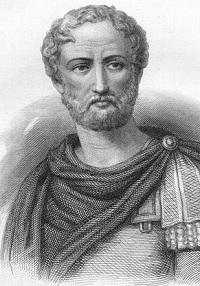 Pliny the Elder
Pliny the Elder
23 AD-August 25, 79 AD
Gaius Plinius Secundus (23 AD-August 25, 79 AD), better known as Pliny the Elder, was a Roman author, naturalist and natural philosopher, as well as naval and army commander of the early Roman Empire and personal friend of the emperor, Vespasian. Spending most of his spare time studying, writing or investigating natural and geographic phenomena in the field, he wrote an encyclopedic work, Naturalis Historia, which became a model for all such works written subsequently.
Pliny’s dates are pinned to the eruption of Vesuvius in August 79 AD and a statement of his nephew that he died in his 56th year, which would make his birth in 23 AD. Pliny was the son of an equestrian, Gaius Plinius Celer, and his wife, Marcella. He was born in Como and had a sister, Plinia, who married into the Caecilii and became the mother of his nephew, Pliny the Younger, whose letters describe his work and study regimen in detail.
Gaius was a scion of the Plinii gens. He did not take his father’s cognomen, Celer, but assumed his own, Secundus. As his adopted son took the same cognomen, Pliny founded a branch, the Plinii Secundi.
Pliny the Elder did not marry and had no children. In his will, he adopted his nephew, which entitled the latter to inherit the entire estate. For at least some of the time, however, Pliny resided under the same roof with his sister and nephew (his brother-in-law died young), as was the case when Pliny decided to investigate the eruption of Mount Vesuvius and was sidetracked by the need for rescue operations upon receipt of a message from his friend asking for assistance.
Pliny had received from the now deceased Vespasian the appointment of praefect of the Roman Navy. On August 24, 79 AD, he was stationed at Misenum at the time of the great eruption of Mount Vesuvius, which overwhelmed Pompeii and Herculaneum. He was preparing to cross the Bay of Naples to observe the phenomenon directly when a message arrived from his friend, Rectina. asking for rescue. Launching the galleys under his command to the evacuation of the opposite shore, he himself took “a fast-sailing cutter,” a decision that may have cost him his life.
As the light vessel approached the shore near Herculaneum, cinders and pumice began to fall on it. Pliny’s helmsman advised turning back, to which Pliny replied, “Fortune favors the brave. Steer to where Pomponianus is.” They landed and found Pomponianus “in the greatest consternation.” Pliny hugged and comforted him. They loaded the cutter but the same winds that brought it to Stabiae prevented it from leaving. Pliny reassured his party by feasting and sleeping while waiting for the wind to abate; but, finally, they had to leave the buildings for fear of collapse and try their luck in the pumice fall. Pliny sat down and could not get up even with assistance and was left behind. His companions theorized that he collapsed and died as a result of inhaling poisonous gases emitted from the volcano. On their return three days later (August 26) after the plume had dispersed, his body was found under the pumice with no apparent external injuries.
The problem with the toxicity theory is that his companions were unaffected by the supposedly toxic fumes and they had no mobility problem, where Pliny had to sit and could not rise. As he is described as a corpulent man, who also suffered from asthma, it is hypothesized that his friends left him because he was already dead.
Source: http://en.wikipedia.org/wiki/Pliny_the_Elder
 Bibliography
Bibliography
Press your browser’s BACK button to return to the previous page.
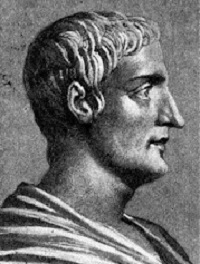 Pliny the Younger
Pliny the Younger
61 AD-c. 112 AD
Gaius Plinius Caecilius Secundus, born Gaius Caecilius or Gaius Caecilius Cilo (61 AD-ca. 112 AD), better known as Pliny the Younger, was a lawyer, author and magistrate of Ancient Rome. Pliny’s uncle, Pliny the Elder, helped raise and educate him. They were both witnesses to the eruption of Vesuvius on August 24, 79 AD.
Pliny is known for his hundreds of surviving letters, which are an invaluable historical source for the time period. Many are addressed to reigning emperors or to notables such as the historian, Tacitus. Pliny himself was a notable figure, serving as an imperial magistrate under Trajan (reigned 98-117 AD).
Pliny the Younger was born in Novum Comum (Como, Northern Italy), the son of Lucius Caecilius Cilo and his wife. Plinia Marcella, a sister of Pliny the Elder. He revered his uncle, Pliny the Elder, and provides sketches of how his uncle worked on the Naturalis Historia.
Pliny’s father died when his son was still young; as a result, Pliny probably lived with his mother. After being first tutored at home, Pliny went to Rome for further education. There, he was taught rhetoric by Quintilian, a great teacher and author. It was at this time that Pliny became closer to his uncle, Pliny the Elder. When Pliny the Younger was 18, his uncle Pliny died attempting to rescue victims of the Vesuvius eruption. The terms of the Elder Pliny’s will passed his estate to his nephew. In the same document, the younger Pliny was adopted by his uncle. As a result, Pliny the Younger changed his name from Gaius Caecilius (or Gaius Caecilius Cilo) to Gaius Plinius Caecilius Secundus.
Pliny is thought to have died suddenly during his appointment in Bithynia-Pontus, around 112 AD, because no events referred to in his letters date later than that.
Source: http://en.wikipedia.org/wiki/Pliny_the_Younger
 Bibliography
Bibliography
Press your browser’s BACK button to return to the previous page.
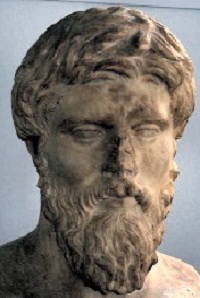 Plutarch
Plutarch
c. 46-120 AD
Plutarch (c. 46-120 AD) was a Greek historian, biographer, essayist and Middle Platonist known primarily for writing Parallel Lives and Moralia.
Plutarch was born in the small town of Chaeronea, in the Greek region known as Boeotia. His family was wealthy. Plutarch studied mathematics and philosophy at the Academy of Athens under Ammonius from 66 to 67. He travelled widely in the Mediterranean world, including central Greece, Sparta, Corinth, Patrae (Patras), Sardes, Alexandria and two trips to Rome.
At some point, Plutarch took up Roman citizenship. As evidenced by his new name, Lucius Mestrius Plutarchus, his sponsor for citizenship was Lucius Mestrius Florus, a Roman of consular status whom Plutarch also used as an historical source for his Life of Otho.
He lived most of his life at Chaeronea and was initiated into the mysteries of the Greek god, Apollo. However, his duties as the senior of the two priests of Apollo at the Oracle of Delphi apparently occupied little of his time. He led an active social and civic life while producing an extensive body of writing, much of which is still extant.
By his writings and lectures, Plutarch became a celebrity in the Roman empire but continued to reside where he was born and actively participated in local affairs, even serving as mayor. At his country estate, guests from all over the empire congregated for serious conversation, presided over by Plutarch in his marble chair. Many of these dialogues were recorded and published, and the 78 essays and other works that have survived are now known collectively as the Moralia.
Plutarch died between the years 119 and 127 AD.
Source: http://en.wikipedia.org/wiki/Plutarch
 Bibliography
Bibliography
Press your browser’s BACK button to return to the previous page.
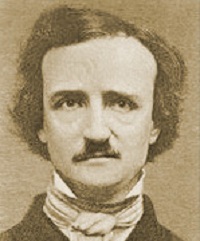 Edgar Allan Poe
Edgar Allan Poe
1809-1849
Edgar Allan Poe (born Edgar Poe, January 19, 1809-October 7, 1849) was an American author, poet, editor and literary critic, considered part of the American Romantic Movement. Best known for his tales of mystery and the macabre, Poe was one of the earliest American practitioners of the short story and is considered the inventor of the detective fiction genre. He is further credited with contributing to the emerging genre of science fiction. He was the first well-known American writer to try to earn a living through writing alone, resulting in a financially difficult life and career.
Born as Edgar Poe in Boston, Massachusetts, he was orphaned young when his mother died shortly after his father abandoned the family. Poe was taken in by John and Frances Allan, of Richmond, Virginia, but they never formally adopted him. He attended the University of Virginia for one semester but left due to lack of money. After enlisting in the U.S. Army and later failing as an officer’s cadet at West Point, Poe parted ways with the Allans. His publishing career began humbly, with an anonymous collection of poems, Tamerlane and Other Poems (1827), credited only to “a Bostonian.”
Poe switched his focus to prose and spent the next several years working for literary journals and periodicals, becoming known for his own style of literary criticism. His work forced him to move among several cities, including Baltimore, Philadelphia and New York City. In Baltimore in 1835, he married Virginia Clemm, his 13-year-old cousin. In January 1845, Poe published his poem, “The Raven,” to instant success. His wife died of tuberculosis two years after its publication. He began planning to publish his own journal, The Penn (later renamed The Stylus), though he died before it could be produced. On October 7, 1849, at age 40, Poe died in Baltimore; the cause of his death is unknown and has been variously attributed to alcohol, brain congestion, cholera, drugs, heart disease, rabies, suicide, tuberculosis and other agents.
Poe and his works influenced literature in the United States and around the world, as well as in specialized fields, such as cosmology and cryptography. Poe and his work appear throughout popular culture in literature, music, films and television. A number of his homes are dedicated museums today.
Source: http://en.wikipedia.org/wiki/Edgar_Allan_Poe
 Bibliography
Bibliography
Press your browser’s BACK button to return to the previous page.
 Roman Polanski
Roman Polanski
1933-
Roman Polanski is a Polish film director, producer, writer and actor. Having made films in Poland, Britain, France and the U.S., he is considered one of the few “truly international filmmakers.”
Polanski’s parents returned to Poland from France in 1936, three years before World War II began. On Germany’s invasion in 1939, as a Jewish family they were all sent to the Krakow ghetto. His parents were then captured and sent to two different concentration camps, his father to Mauthausen-Gusen in Austria, where he survived the war, and his mother to Auschwitz, where she was murdered. He witnessed his father’s capture and then, at 7, managed to escape the ghetto and survive the war, at first wandering through the Polish countryside pretending to be a Roman-Catholic visiting his relatives.
Although this saved his life, he was severely mistreated, suffering a near-fatal beating that left him with a fractured skull. Local people usually ignored the cinemas where German films were shown, but Polanski seemed little concerned by the propaganda and often went to the movies. As the war progressed, Poland became increasingly war torn and he lived life as a tramp, hiding in barns and forests, eating whatever he could steal or find. Still under 12 years old, he encountered some Nazi soldiers who forced him to hold targets while they shot at them.
At the war’s end in 1945, he was reunited with his father, who sent him to technical school, but young Polanski seemed to have already chosen another career. In the 1950s, he took up acting, appearing in Andrzej Wajda’s A Generation (1955) before studying at the Lodz Film School. His early shorts – such as Dwaj ludzie z szafa (1958), The Fat and the Lean (1961) and Mammals (1962) – showed his taste for black humor and interest in bizarre human relationships. His feature debut, Knife in the Water (1962), was the first Polish post-war film not associated with the war theme.
Though already a major Polish filmmaker, Polanski chose to leave the country and headed to France. While down-and-out in Paris, he befriended young scriptwriter, Gerard Brach, who eventually became his longtime collaborator. The next two films, Repulsion (1965) and Cul-de-sac (1966), made in England and co-written by Brach, won Silver and then Golden Bear awards at the Berlin Film Festivals.
In 1968, Polanski went to Hollywood, where he made the psychological thriller, Rosemary’s Baby (1968). However, after the brutal murder of his wife, Sharon Tate, by the infamous Manson gang in 1969, the director decided to return to Europe.
In 1974, he again made a U.S. release: Chinatown (1974). It seemed the beginning of a promising Hollywood career but, after his conviction for the statutory rape of a 13-year old girl, Polanski fled from the U.S. to avoid prison. After Tess (1979), which was awarded several Oscars and Cesars, his work became intermittent and rarely approached the caliber of his earlier films.
Source: https://en.wikipedia.org/wiki/Roman_Polanski
 Bibliography
Bibliography
Press your browser’s BACK button to return to the previous page.
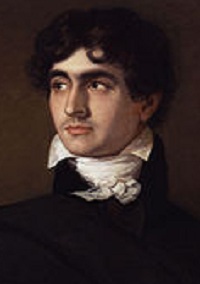 John William Polidori
John William Polidori
1795-1821
John William Polidori (September 7, 1795-August 24, 1821) was an Italian-English physician and writer, known for his associations with the Romantic movement and credited by some as the creator of the vampire genre of fantasy fiction. His most successful work was the 1819 short story, “The Vampyre,” the first vampire story in English.
He was the oldest son of Gaetano Polidori, an Italian political emigre scholar, and Anna Maria Pierce, a governess. Polidori was one of the earliest pupils at recently established Ampleforth College from 1804 and, in 1810, went up to the University of Edinburgh, where he wrote a thesis on sleepwalking and received his degree as a doctor of medicine on August 1, 1815, at the age of 19.
In 1816, Polidori entered Lord Byron’s service as his personal physician and accompanied the poet on a trip through Europe. Publisher John Murray offered Polidori 500 English pounds to keep a diary of their travels, which Polidori’s nephew, William Michael Rossetti, later edited. At the Villa Diodati, a house Byron rented by Lake Geneva in Switzerland, the pair met with Mary Wollstonecraft Godwin, her husband-to-be, Percy Bysshe Shelley, and their companion (Mary’s stepsister) Claire Clairmont.
One night in June, after the company had read aloud from Tales of the Dead, a collection of horror tales, Byron suggested that they each write a ghost story. Percy Bysshe Shelley wrote, “A Fragment of a Ghost Story;” Mary Shelley worked on a tale that would later evolve into Frankenstein; Byron wrote (and quickly abandoned) a fragment of a story, “Fragment of a Novel,” about the main character Augustus Darvell, which Polidori used later as the basis for his own tale, “The Vampyre.”
Dismissed by Byron, Polidori travelled in Italy and then returned to England. His story, “The Vampyre,” which featured the main character Lord Ruthven, was published in the April 1819 issue of New Monthly Magazine without his permission. While in London, he lived on Great Pulteney Street in Soho. Much to both his and Byron’s chagrin, “The Vampyre” was released as a new work by Byron. Byron even released his own “Fragment of a Novel” in an attempt to clear up the mess but, for better or worse, “The Vampyre” continued to be attributed to him.
His long, Byron-influenced theological poem, “The Fall of the Angels,” was published anonymously in 1821.
Polidori died in London on August 24, 1821, weighed down by depression and gambling debts.
Source: http://en.wikipedia.org/wiki/John_Polidori
 Bibliography
Bibliography
Press your browser’s BACK button to return to the previous page.
 Michael Pollan
Michael Pollan
1955-
Michael Pollan (born February 6, 1955) is an American author, journalist, activist and professor of journalism at the University of California, Berkeley.
Pollan was born in Long Island, New York, to author and financial consultant, Stephen Pollan, and columnist Corky Pollan. Pollan received a B.A. from Bennington College in 1977 and an M.A. in English from Columbia University in 1981.
In The Omnivore’s Dilemma (2006), Pollan describes four basic ways in which human societies have obtained food: The current industrial system, the big organic operation, the local self-sufficient farm and the hunter-gatherer.
In The Botany of Desire, Pollan explores the concept of co-evolution, specifically of humankind’s evolutionary relationship with four plants – apples, tulips, marijuana and potatoes – from the dual perspectives of humans and the plants.
Pollan’s latest book, In Defense of Food: An Eater’s Manifesto, released on January 1, 2008, explores the relationship with what he terms nutritionism and the Western diet, with a focus on late 20th century food advice given by the science community.
Pollan has contributed to Greater Good, a social psychology magazine published by the Greater Good Science Center at University of California, Berkeley. His article, “Edible Ethics,” discusses the intersection of ethical eating and social psychology.
In his 1998 book, A Place of My Own: The Education of an Amateur Builder, Pollan methodically traced the design and construction of the out-building where he writes. The 2008 re-release of this book was re-titled, A Place of My Own: The Architecture of Daydreams.
Pollan is a contributing writer for The New York Times Magazine, a former executive editor for Harper’s Magazine and author of five books: In Defense of Food: An Eater’s Manifesto (2008); The Omnivore’s Dilemma: A Natural History of Four Meals (2006); The Botany of Desire: A Plant’s-Eye View of the World (2001); A Place of My Own (1997); and Second Nature: A Gardener’s Education (1991).
Source: http://en.wikipedia.org/wiki/Michael_Pollan
 Bibliography
Bibliography
Press your browser’s BACK button to return to the previous page.
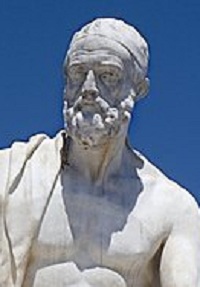 Polybius
Polybius
c. 200-118 BC
Polybius (ca. 200-118 BC) was a Greek historian of the Hellenistic Period noted for his work, The Histories, which covered the period of 220-146 BC in detail. The work describes in part the rise of the Roman Republic and its gradual domination over Greece. Polybius is also renowned for his ideas concerning the separation of powers in government, later used in Montesquieu’s The Spirit of the Laws and in the drafting of the United States Constitution.
Polybius was born in Arcadia around 200 BC. He was the son of Lycortas, a Greek politician who became Cavalry Commander of the Achaean League. His father’s opposition to Roman control of Macedonia resulted in his imprisonment. Polybius was then deported to Rome, where Lucius Aemilius Paulus employed him to tutor his two sons.
Polybius had the opportunity to return to Macedonia in 152 BC; he elected to stay, however, in Rome, as by that time he had placed his allegiance in the Roman Republic. He became a close friend of the Roman military commander, Scipio Aemilianus, accompanying the general to Hispania and Africa. Polybius’ The Histories provides a detailed account of Rome’s ascent to empire and included his eyewitness accounts of the Roman victory over Hannibal and the Sack of Carthage in 146 BC. Polybius held that historians should only chronicle events whose participants the historian was able to interview; he was among the first to champion the notion of having factual integrity in historical writing while avoiding bias.
In his later years, Polybius resided in Rome, completing his historical work while occasionally undertaking long journeys through the Mediterranean countries in the furtherance of his history, in particular with the aim of obtaining firsthand knowledge of historical sites. It also appears that Polybius interviewed veterans in order to clarify details of the events he was recording and it would appear he was similarly given access to archival material.
Little is known of Polybius’ later life; he most likely accompanied Scipio to Spain, acting as his military advisor during the Numantine War. He later wrote about this war in a lost monograph. It is probable that Polybius returned to Greece later in his life, as evidenced by the many existent inscriptions and statues of him in Greece.
The last event mentioned in his Histories seems to be the construction of the Via Domitia in southern France in 118 BC, which suggests the writings of Pseudo-Lucian may have some grounding in fact when he states that “[Polybius] fell from his horse while riding up from the country, fell ill as a result and died at the age of 82.”
Source: http://en.wikipedia.org/wiki/Polybius
 Bibliography
Bibliography
Press your browser’s BACK button to return to the previous page.
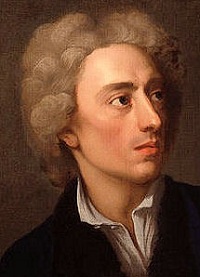 Alexander Pope
Alexander Pope
1688-1744
Alexander Pope Jr. (May 21, 1688-May 30, 1744) was an 18th century English poet, best known for his satirical verse and for his translation of Homer.
Pope was born to Alexander Pope Sr. (1646-1717), a linen merchant of Plough Court, Lombard Street, London, and his wife, Edith (nee Turner) (1643-1733), who were both Catholics. Pope’s education was affected by the recently enacted Test Acts, which upheld the status of the established Church of England and banned Catholics from teaching, attending a university, voting or holding public office on pain of perpetual imprisonment. Pope was taught to read by his aunt and went to Twyford School in about 1698/99. He then went to two Catholic schools in London. Such schools, while illegal, were tolerated in some areas.
Pope’s formal education ended at this time and from then on he was mostly self-educated by reading the works of classical writers, such as the satirists Horace and Juvenal; the epic poets, Homer and Virgil; as well as English authors, such as Geoffrey Chaucer, William Shakespeare and John Dryden. He also studied many languages and read works by English, French, Italian, Latin and Greek poets.
From the age of 12, he suffered numerous health problems, such as Pott’s disease (a form of tuberculosis that affects the bone), which deformed his body and stunted his growth, leaving him with a severe hunchback. His tuberculosis infection caused other health problems, including respiratory difficulties, high fevers, inflamed eyes and abdominal pain. He grew to a height of only 4’ 6” tall. Pope was already removed from society because he was Catholic; his poor health only alienated him further. Although he never married, he had many female friends to whom he wrote witty letters.
Pope was introduced to the aging playwright, William Wycherley, and to William Walsh, a minor poet, who helped Pope revise his first major work, The Pastorals. In May 1709, Pope’s Pastorals was published in the sixth part of Tonson’s Poetical Miscellanies. This brought Pope instant fame, and was followed by “An Essay on Criticism,” published in May 1711, which was equally well received. In March 1713, Windsor Forest was published to great acclaim.
As a result of Pope’s friendship with Joseph Addison, he contributed to Addison’s play, Cato, as well as writing for The Guardian and The Spectator. Around this time, he began the work of translating The Iliad, which was a painstaking process – publication began in 1715 and did not end until 1720.
The money made from his translation of Homer allowed Pope to move to a villa at Twickenham in 1719, where he created his now-famous grotto and gardens.
Pope died in his villa, surrounded by friends, on May 30, 1744.
Source: http://en.wikipedia.org/wiki/Alexander_Pope
 Bibliography
Bibliography
Press your browser’s BACK button to return to the previous page.
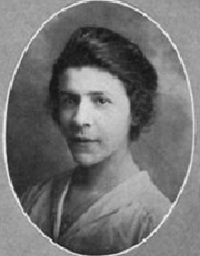 Esther Popel
Esther Popel
1896-1958
Esther Popel was known as a poet of the Harlem Renaissance period. She worked as a review editor for a number of African-American journals, predominately for The Journal of Negro Education. Popel was born in Harrisburg, Pennsylvania, and graduated from Dickinson College in Carlisle, Pennsylvania. She taught at two schools in the Washington, D.C. area: Francis Jr. High and Shaw Jr. High (she taught French and Spanish at Francis Jr. High School.) Popel was a member of Phi Beta Kappa and was fluent in four languages: French, Spanish, Latin and German.
Her book, A Forest Pool, was privately printed. Many of her works/reviews seemed to highlight the injustice of the American system toward African-Americans. In her review of A Colored Woman in a White World, written by Mary Church Terrell, Popel called attention to the fact that H.G. Wells went against his self-imposed precedent to write and questioned how the president of Cornell University, President White (1883), could have made bold statements about an America free from prejudice and intolerance. Wells was quoted as stating that the life presented in the Terrell autobiography was filled with violence, injustice and insult in which “she has been compelled to live her life.” Popel noted that it was significant to think about the fact that Wells chose to put his thought in writing in such a direct book that highlighted the problems of African-Americans.
In reading Popel’s poems, it is good to keep in mind that she lived during the Great Depression and the formation of the Harlem Renaissance period.
Popel was active in the literary salon that was hosted by poet Georgia Douglas Johnson. She also became friends with Langston Hughes and Marita Bonner. Popel’s poetry style has been listed as lyrical, religious and political.
Her personal information is difficult to locate, but what is known is that she was married to William A. Shaw, who died in 1946. They had one daughter, Patricia Shaw Iversen.
Source: http://oldpoetry.com/oauthor/show/esther_popel
 Bibliography
Bibliography
Press your browser’s BACK button to return to the previous page.
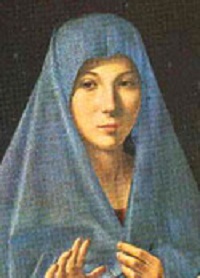 Marguerite Porete
Marguerite Porete
d. 1310
Marguerite Porete (died 1310) was a French mystic and the author of The Mirror of Simple Souls, a work of Christian spirituality dealing with the workings of divine love.
Porete’s life is recorded only in accounts of her trial for heresy. Her biography is probably biased and certainly incomplete. She is associated with the Beguine movement and was, therefore, able to travel fairly freely. Some also associated her with the Brethren of the Free Spirit movement, a group considered heretical because of its antinomian views. The connection between Porete and the Free Spirits is somewhat tenuous, though, as further scholarship has determined that they were less closely related than some Church authorities believed.
She was burned at the stake for heresy in Paris in 1310 after a lengthy trial, having refused to remove her book from circulation or recant her views. The book is cited as one the primary texts of the Medieval Heresy of the Free Spirit.
Source: http://en.wikipedia.org/wiki/Marguerite_Porete
 Bibliography
Bibliography
Press your browser’s BACK button to return to the previous page.
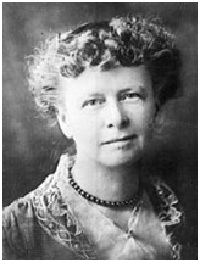 Eleanor Hodgman Porter
Eleanor Hodgman Porter
1868-1920
Eleanor Hodgman Porter (December 19, 1868-May 21, 1920) was an American novelist.
Born in Littleton, New Hampshire, Hodgman was trained as a singer but later turned to writing. In 1892, she married John Lyman Porter and moved to Massachusetts.
Porter mainly wrote children’s literature, including three Miss Billy books (Miss Billy, Miss Billy’s Decision and Miss Billy Married), Just David (1916), Six Star Ranch (1916), Cross Currents (1928) and The Turn of the Tide (1908).
Her most famous novel is Pollyanna (1913), later followed by a sequel, Pollyanna Grows Up (1915). Her adult novels include: The Turn of the Tide (1908), The Road to Understanding (1916), Oh Money! Money! (1917), Dawn (1918), Keith’s Dark Tower (1919), Mary Marie (1920), The Story of Marco (1920) and Sister Sue (1921); her short stories include “Money, Love and Kate” (1924). Porter achieved considerable commercial success: In 1913, Pollyanna ranked eighth among bestselling novels in the United States, second in 1914, and fourth in 1915 (it went through 47 printings between 1915 and 1920); in 1916, Just David ranked third; in 1917, The Road to Understanding ranked fourth; in 1918, Oh Money! Money! ranked fifth
She died in Cambridge, Massachusetts, in 1920.
Source: http://en.wikipedia.org/wiki/Eleanor_H._Porter
 Bibliography
Bibliography
Press your browser’s BACK button to return to the previous page.
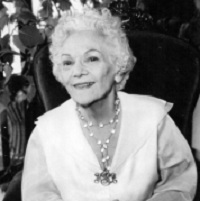 Katherine Anne Porter
Katherine Anne Porter
1890-1980
Katherine Anne Porter (May 15, 1890-September 18, 1980) was a Pulitzer Prize-winning American journalist, essayist, short story writer, novelist and political activist. Her 1962 novel, Ship of Fools, was the bestselling novel in America that year, but her short stories received much more critical acclaim. She is known for her penetrating insight; her work deals with dark themes, such as betrayal, death and the origin of human evil. In 1990, Recorded Texas Historic Landmark number 2905 was placed in Brown County, Texas, to honor the life and career of Porter.
Porter, born as Callie Russell Porter in Indian Creek, Texas, was the fourth of five children of Harrison Boone Porter and Alice (Jones) Porter.
In 1906, at age 16, Porter left home and married John Henry Koontz, son of a wealthy Texas ranching family, and subsequently converted to Koontz’s religion, Roman Catholicism. Koontz was physically abusive. They divorced officially in 1915.
In 1915, she was diagnosed with tuberculosis and spent the following two years in sanatoria, where she decided to become a writer. It was discovered during that time, however, that she had bronchitis, not tuberculosis. In 1917, she began writing for The Fort Worth Critic, critiquing dramas and writing society gossip. In 1918, she wrote for The Rocky Mountain News in Denver, Colorado. In the same year, she almost died in Denver during the 1918 flu pandemic. When she was discharged from the hospital months later, she was frail and completely bald. When her hair finally grew back, it was white and remained that color for the rest of her life. Her experiences during treatment provided the background for her long story, “Pale Horse, Pale Rider.”
Between 1920 and 1930, Porter traveled back and forth between Mexico and New York City and began publishing short stories and essays. Her first published story was “Maria Concepcion” in The Century Magazine. In 1930, she published her first short story collection, Flowering Judas and Other Stories. From 1948 to 1958, Porter taught at Stanford University, the University of Michigan, Washington and Lee University and the University of Texas, where her unconventional manner of teaching made her popular with students. In 1962, she published her only novel, Ship of Fools, which was the bestselling novel in America for that year; its success finally gave her financial security.
Despite Porter’s claim that after the publication of Ship of Fools she would not win any more prizes in America, in 1966 she was awarded the Pulitzer Prize and the National Book Award for The Collected Stories of Katherine Anne Porter, and that year was also appointed to the American Academy of Arts and Letters.
In 1977, Porter published “The Never-Ending Wrong,” an account of the notorious trial and execution of Sacco and Vanzetti, which she had protested 50 years earlier.
Porter died in Silver Spring, Maryland, on September 18, 1980, at the age of 90. Her ashes were buried next to her mother’s at Indian Creek Cemetery in Texas.
Source: http://en.wikipedia.org/wiki/Katherine_Anne_Porter
 Bibliography
Bibliography
Press your browser’s BACK button to return to the previous page.
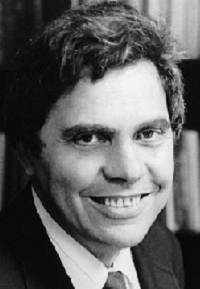 Neil Postman
Neil Postman
1931-2003
Neil Postman (March 8, 1931-October 5, 2003) was an American author, media theorist and cultural critic who is best known by the general public for his 1985 book about television, Amusing Ourselves to Death. For more than 40 years, he was associated with New York University. Postman was a humanist who believed that “new technology can never substitute for human values.”
Postman was born and spent most of his life in New York City. In 1953, he graduated from State University of New York at Fredonia, where he played basketball. He received a master’s degree in 1955 and an Ed.D in 1958, both from the Teachers College, Columbia University, and started teaching at New York University in 1959. In 1971, he founded a graduate program in media ecology at the Steinhardt School of Education (originally known as SEHNAP, School of Education, Health, Nursing and Arts Professions of NYU). In 1993, he was appointed a University Professor, the only one in the School of Education, and was chairman of the Department of Culture and Communication until 2002.
He died of lung cancer in Flushing, Queens, on October 5, 2003.
Source: http://en.wikipedia.org/wiki/Neil_Postman
 Bibliography
Bibliography
Press your browser’s BACK button to return to the previous page.
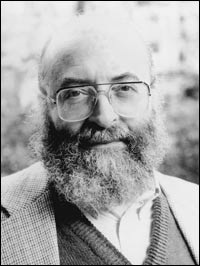 Chaim Potok
Chaim Potok
1929-2002
Chaim Potok (February 17, 1929-July 23, 2002) was a Jewish-American author and rabbi. Potok is most famous for his first book, The Chosen, a 1967 novel that was listed on The New York Times bestseller list for 39 weeks and sold more than 3,400,000 copies.
Herman Harold Potok was born in the Bronx, New York City, to Benjamin Max and Mollie (nee Friedman) Potok, Jewish immigrants from Poland. He was the oldest of four children, all of whom either became rabbis or married one. His Hebrew name was Chaim Tzvi. He received an Orthodox Jewish education. After reading Evelyn Waugh’s novel, Brideshead Revisited, as a teenager, he decided to become a writer. He started writing fiction at the age of 16. At 17, he made his first submission to the magazine, The Atlantic Monthly. Although it wasn’t published, he received a note from the editor complimenting his work.
In 1949, at the age of 20, his stories were published in the literary magazine of Yeshiva University, which he also helped edit. In 1950, Potok graduated summa cum laude with a B.A. in English Literature.
After four years of study at the Jewish Theological Seminary of America, he was ordained as a Conservative rabbi. He was appointed director of LTF, Leaders Training Fellowship, a youth organization affiliated with Conservative Judaism.
After receiving a master’s degree in Hebrew literature, Potok enlisted with the U.S. Army as a chaplain. He served in South Korea from 1955 to 1957. Upon his return, he joined the faculty of the University of Judaism in Los Angeles and became the director of a Conservative Jewish summer camp affiliated with the Conservative movement. A year later, he began his graduate studies at the University of Pennsylvania and was appointed scholar-in-residence at Temple Har Zion in Philadelphia. In 1963, he spent a year in Israel, where he wrote his doctoral dissertation about Solomon Maimon and began to write a novel.
In 1964, Potok moved to Brooklyn. He became the managing editor of the magazine, Conservative Judaism, and joined the faculty of the Teachers’ Institute of the Jewish Theological Seminary. The following year, he was appointed editor-in-chief of the Jewish Publication Society in Philadelphia and, later, chairman of the publication committee. Potok received a doctorate in philosophy from the University of Pennsylvania. In 1970, he relocated to Jerusalem with his family. He returned to Philadelphia in 1977.
After the publication of Old Men at Midnight, he was diagnosed with brain cancer. He died at his home in Merion, Pennsylvania, on July 23, 2002, aged 73.
Source: http://en.wikipedia.org/wiki/Chaim_Potok
 Bibliography
Bibliography
Press your browser’s BACK button to return to the previous page.
 Beatrix Potter
Beatrix Potter
1866-1943
Helen Beatrix Potter (July 28, 1866-December 22, 1943) was an English author, illustrator, mycologist and conservationist best known for children’s books featuring anthropomorphic characters in such stories as The Tale of Peter Rabbit.
Born into a privileged household, Potter was educated by governesses and grew up isolated from other children. She had numerous pets and spent holidays in Scotland and the Lake District, developing a love of landscape, flora and fauna, all of which she closely observed and painted. Her parents discouraged her intellectual development as a young woman, but her study and watercolors of fungi led to her being widely respected in the field of mycology.
In her 30s, Potter published the highly successful children’s book, The Tale of Peter Rabbit, after which she began writing and illustrating children’s books full-time. With proceeds from the books, she became financially independent of her parents and was eventually able to buy Hill Top Farm in the Lake District. She extended the property with other purchases over time. In her 40s, she married William Heelis, a local solicitor, became a sheep breeder and farmer while continuing to write and illustrate books for children. She published 23 books.
Potter died on December 22, 1943, and left almost all of her property to the National Trust.
Source: http://en.wikipedia.org/wiki/Beatrix_Potter
 Bibliography
Bibliography
Press your browser’s BACK button to return to the previous page.
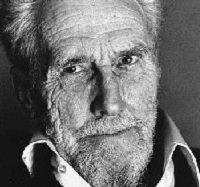 Ezra Pound
Ezra Pound
1885-1972
Ezra Pound is generally considered the poet most responsible for defining and promoting a Modernist aesthetic in poetry. In the early teens of the 20th century, he opened a seminal exchange of work and ideas between British and American writers and was famous for the generosity with which he advanced the work of such major contemporaries as W.B. Yeats, Robert Frost, William Carlos Williams, Marianne Moore, H.D., James Joyce, Ernest Hemingway and especially T.S. Eliot.
His own significant contributions to poetry begin with his promulgation of Imagism, a movement in poetry that derived its technique from classical Chinese and Japanese poetry – stressing clarity, precision and economy of language and foregoing traditional rhyme and meter in order to, in Pound’s words, “compose in the sequence of the musical phrase, not in the sequence of the metronome.” His later work, for nearly 50 years, focused on the encyclopedic epic poem he entitled, “The Cantos.”
Pound was born in Hailey, Idaho, in 1885. He completed two years of college at the University of Pennsylvania and earned a degree from Hamilton College in 1905. After teaching at Wabash College for two years, he travelled abroad to Spain, Italy and London where, as the literary executor of the scholar Ernest Fenellosa, he became interested in Japanese and Chinese poetry. He married Dorothy Shakespear in 1914 and became London editor of The Little Review in 1917.
In 1924, he moved to Italy. During this period of voluntary exile, Pound became involved in Fascist politics and did not return to the United States until 1945, when he was arrested on charges of treason for broadcasting Fascist propaganda by radio to the United States during World War II. In 1946, he was acquitted but declared mentally ill and committed to St. Elizabeth’s Hospital in Washington, D.C. During his confinement, the jury of the Bollingen-Library of Congress Award (which included a number of the most eminent writers of the time) decided to overlook Pound’s political career in the interest of recognizing his poetic achievements and awarded him the prize for the Pisan Cantos (1948). After continuous appeals from writers won his release from the hospital in 1958, Pound returned to Italy and settled in Venice, where he died, a semi-recluse, in 1972.
Source: http://www.poets.org/poet.php/prmPID/161
 Bibliography
Bibliography
Press your browser’s BACK button to return to the previous page.
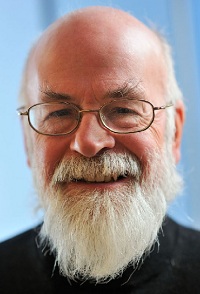 Terry Pratchett
Terry Pratchett
1948-2015
Sir Terence David John Pratchett, OBE (April 28, 1948-March 12, 2015), more commonly known as Terry Pratchett, was an English novelist known for his frequently comical work in the fantasy genre. He was best known for his popular and long-running Discworld series of comic fantasy novels. Pratchett’s first novel, The Carpet People, was published in 1971 and, since his first Discworld novel (The Colour of Magic) was published in 1983, he wrote two books a year on average.
Pratchett was the UK’s bestselling author of the 1990s and, as of December 2007, had sold more than 55 million books worldwide, with translations made into 36 languages. He was the second most-read writer in the UK and seventh most-read non-U.S. author in the U.S. In 2001, he won the Carnegie Medal for his young adult novel, The Amazing Maurice and his Educated Rodents.
Pratchett was appointed Officer of the Order of the British Empire (OBE) “for services to literature” in 1998. He was knighted in the 2009 New Year Honours.
In December 2007, Pratchett announced that he had been diagnosed with early-onset Alzheimer’s disease. He later made a substantial public donation to the Alzheimer’s Research Trust (now Alzheimer’s Research UK), filmed a television programme chronicling his experiences with the disease for the BBC, and also became a patron for Alzheimer’s Research UK.
Pratchett died on March 12, 2015 aged 66.
Source: http://en.wikipedia.org/wiki/Pratchett
 Bibliography
Bibliography
Press your browser’s BACK button to return to the previous page.
 Richard Preston
Richard Preston
1954-
Richard Preston, born August 5, 1954, in Cambridge, Massachusetts, is a New Yorker writer and bestselling author perhaps best-known for his books about infectious disease epidemics and bioterrorism, although he has written other nonfiction works. Preston’s personal hobby of recreational tree climbing is introduced in his book, The Wild Trees (2007).
Preston graduated from Wellesley High School in Massachusetts in 1972. He attended Pomona College, in Claremont, California.
His 1992 New Yorker article, “Crisis in the Hot Zone,” was expanded into his best-known book, The Hot Zone (1994). It is classified as a “nonfiction thriller” about the Ebola virus.
Preston’s novel, The Cobra Event (1998), was about the terroristic release of a fictional virus combining various qualities of different diseases upon New York City.
The Demon in the Freezer (2002) covers the story of the eradication of smallpox, perhaps the most destructive virus to have plagued mankind.
First Light, American Steel and The Wild Trees are nonfiction books addressing astrophysics, the steel industry and California Redwoods, respectively. Preston’s latest release, Panic in Level 4, is a collection of essays related to his experiences researching his previous novels.
Preston resides in Hopewell, New Jersey.
Source: http://en.wikipedia.org/wiki/Richard_Preston
 Bibliography
Bibliography
Press your browser’s BACK button to return to the previous page.
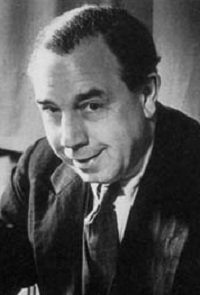 J.B. Priestley
J.B. Priestley
1894-1984
John Boynton Priestley (September 13, 1894-August 14, 1984), known as J.B. Priestley, was an English novelist, playwright and broadcaster. He published 26 novels, notably The Good Companions (1929), as well as numerous dramas, such as An Inspector Calls. His output included literary and social criticism.
Priestley was born at 34 Mannheim Road, Manningham, which he described as an “ultra-respectable” suburb of Bradford. Priestley was educated at Belle Vue Grammar School, which he left at 16 to work as a junior clerk at Helm & Co., a wool firm in the Swan Arcade. During his years at Helm & Co. (1910-1914), he started writing at night and had articles published in local and London newspapers. He was to draw on memories of Bradford in many of the works he wrote after he had moved south, including Bright Day and When We Are Married.
Priestley served during World War I in the 10th Battalion, the Duke of Wellington’s Regiment. After his military service, Priestley received a university education at Trinity Hall, Cambridge. By the age of 30, he had established a reputation as a humorous writer and critic. He wrote his novel, Benighted, in 1927.
Priestley’s first major success came with a novel, The Good Companions (1929). His next novel, Angel Pavement (1930), further established him as a successful novelist. In 1934, he published the travelogue, English Journey, which is an account of what he saw and heard while travelling through the country in the autumn of the previous year.
He moved into a new genre and became equally well-known as a dramatist. Dangerous Corner was the first of a series of plays that enthralled West End theatre audiences. His best-known play is An Inspector Calls (1945).
During World War II, he was a regular broadcaster on the BBC. The Postscript, broadcast on Sunday night through 1940 and again in 1941, drew peak audiences of 16 million; only Winston Churchill was more popular with listeners.
Although Priestley never wrote a formal book of memoirs, his literary reminiscences, Margin Released (1962), provide valuable insights into his work.
Source: http://en.wikipedia.org/wiki/J._B._Priestley
 Bibliography
Bibliography
Press your browser’s BACK button to return to the previous page.
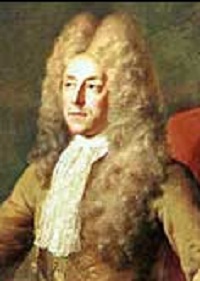 Matthew Prior
Matthew Prior
1664-1721
Matthew Prior, English poet and diplomatist, was the son of a Nonconformist joiner at Wimborne-Minster, East Dorset, and was born on July 21, 1664. His father moved to London and sent him to Westminster, under Dr. Busby. At his father’s death, he left school and fell to the care of his uncle, a vintner in Channel Row. Here, Lord Dorset found him reading Horace and set him to translate an ode. He acquitted himself so well that the earl offered to contribute to the continuance of his education at Westminster. Prior later accepted a scholarship recently founded at St John’s College.
He took his B.A. degree in 1686 and, two years later, became a fellow. He wrote in 1687 “The City Mouse and Country Mouse,” in ridicule of Dryden’s “Hind and Panther.” Three years later, Prior was gazetted secretary to the embassy at the Hague. After four years of this employment, he was appointed one of the gentlemen of the king’s bedchamber.
The poet’s knowledge of French is specially mentioned among his qualifications, and this was recognized by his being sent in the following year to Paris in attendance on the English ambassador. At this period, Prior could say with good reason that “he had commonly business enough upon his hands, and was only a poet by accident.” To verse, however, which had laid the foundation of his fortunes, he still occasionally trusted as a means of maintaining his position. His occasional poems during this period include: an elegy on Queen Mary in 1695; a satirical version of Boileau’s “Ode sur le prise de Namur” (1695); some lines on William’s escape from assassination in 1696; and a brief piece called “The Secretary.” After his return from France, Prior became under-secretary of state and succeeded John Locke as a commissioner of trade.
In 1709, he had already published a collection of verse. During an imprisonment, he wrote his longest humorous poem, “Alma; or the Progress of the Mind.” This, along with his most ambitious work, Solomon and other Poems on several Occasions, was published by subscription in 1718. The sum received for this volume (4,000 guineas), with a present of £4,000 from Lord Harley, enabled him to live in comfort.
He died at Wimpole, Cambridgeshire, a seat of the earl of Oxford, on September 18, 1721, and was buried in Westminster Abbey.
Source: http://www.luminarium.org/eightlit/prior/priorbio.htm
 Bibliography
Bibliography
Press your browser’s BACK button to return to the previous page.
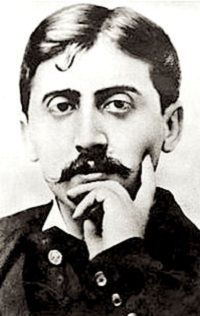 Marcel Proust
Marcel Proust
1871-1922
Valentin Louis Georges Eugene Marcel Proust (July 10, 1871-November 18, 1922) was a French novelist, critic and essayist best known for his monumental A la recherche du temps perdu (In Search of Lost Time; earlier translated as Remembrance of Things Past). It was published in seven parts between 1913 and 1927.
Proust was born in Auteuil. By the age of nine, he had his first serious asthma attack and thereafter was considered a sickly child.
Despite his poor health, Proust served a year (1889-90) as an enlisted man in the French army, stationed at Coligny Barracks in Orleans, an experience that provided a lengthy episode in The Guermantes’ Way, part three of his novel. As a young man, Proust was a dilettante and a social climber whose aspirations as a writer were hampered by his lack of discipline. His reputation from this period, as a snob and an amateur, contributed to his later troubles with getting Swann’s Way, the first part of his large-scale novel, published in 1913.
In an 1892 article published in Le Banquet entitled “L’Irreligion d’Etat,” and again in a 1904 Le Figaro article entitled “La mort des cathedrals,” Proust argued against the separation of Church and State, declaring that socialism posed a greater threat to society than the Church and emphasizing the latter’s role in sustaining a cultural and educational tradition.
Proust spent the last three years of his life mostly confined to his cork-lined bedroom, sleeping during the day and working at night to complete his novel.
He died of pneumonia and a pulmonary abscess in 1922.
Source: http://en.wikipedia.org/wiki/Marcel_Proust
 Bibliography
Bibliography
Press your browser’s BACK button to return to the previous page.
 J.H. Prynne
J.H. Prynne
1936-
Jeremy Halvard Prynne (born June 24, 1936) is a British poet closely associated with the British Poetry Revival.
Prynne’s early influences include Charles Olson and Donald Davie. His first book, Force of Circumstance and Other Poems, was published in 1962; Prynne has excluded it from his canon. His Poems (1982) collected all the work he wanted to keep in print, beginning with Kitchen Poems (1968). An expanded and updated version appeared in 1999, with another, further updated edition published in 2005. Prynne was one of the key figures in the Cambridge group of Revival poets and was a major contributor to The English Intelligencer.
In addition to his poetry, Prynne has published a wide range of critical and academic prose. A transcription of a 1971 lecture on Olson’s Maximus Poems at Simon Fraser University has had wide circulation. His longer works include a monograph on “Saussure, Stars, Tigers and the Shape of Words,” and self-published, book-length commentaries on poems by Wordsworth (“Field Notes,” “The Solitary Reaper” and others) and Shakespeare (“They That Haue Powre to Hurt;” “A Specimen of a Commentary on Shakespeare’s Sonnets, 94”). His essay on “New Songs” from A Jade Terrace, an anthology of early Chinese love poetry, was included in the 2nd edition of the book from Penguin 1982. He has written poetry in classical Chinese under the name Pu Ling-en.
Prynne is a Life Fellow of Gonville and Caius College, Cambridge. As of October 2005, he has retired from his posts teaching English Literature as a Lecturer and University Reader in English Poetry for the University of Cambridge and as Director of Studies in English for Gonville and Caius College; he retired as Librarian of the College at the end of September 2006.
Source: http://en.wikipedia.org/wiki/J._H._Prynne
 Bibliography
Bibliography
Press your browser’s BACK button to return to the previous page.
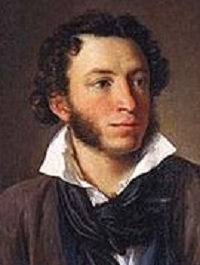 Alexander Pushkin
Alexander Pushkin
1799-1837
Alexander Sergeyevich Pushkin (June 6, 1799-February 10, 1837) was a Russian author of the Romantic era who is considered by many to be the greatest Russian poet and the founder of modern Russian literature.
Born into the Russian nobility in Moscow, Pushkin published his first poem at the age of 15 and was widely recognized by the literary establishment by the time of his graduation from the Imperial Lyceum in Tsarskoye Selo.
Pushkin had some Slavophile sympathies, which were combined with a deep admiration for Classical Liberalism. While under the strict surveillance of the Tsar’s political police and unable to publish, Pushkin wrote his most famous play, the drama Boris Godunov. Later, during the reign of Nicholas I, Pushkin held moderately conservative views. His novel in verse, Eugene Onegin, was serialized between 1825 and 1832.
Notoriously touchy about his honor, Pushkin fought a total of 29 duels. At the age of 37 years, however, he was fatally wounded in such an encounter with Georges-Charles de Heeckeren d’Anthes. D’Anthes, a French officer serving with the Chevalier Guard Regiment, had been attempting to seduce the poet’s wife, Natalya Pushkina.
Source: http://en.wikipedia.org/wiki/Alexander_Pushkin
 Bibliography
Bibliography
Press your browser’s BACK button to return to the previous page.
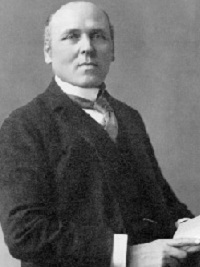 Howard Pyle
Howard Pyle
1853-1911
Howard Pyle (March 5, 1853-November 9, 1911) was an American illustrator and author, primarily of books for young people. A native of Wilmington, Delaware, he spent the last year of his life in Florence, Italy.
During 1894, he began teaching illustration at the Drexel Institute of Art, Science and Industry (now Drexel University) and, after 1900, he founded his own school of art and illustration, the Howard Pyle School of Illustration Art. The term Brandywine School was later applied to the illustration artists and Wyeth family artists of the Brandywine region by Pitz.
His 1883 classic publication, The Merry Adventures of Robin Hood, remains in print and his other books, frequently with medieval European settings, include a four-volume set on King Arthur. He is also well known for his illustrations of pirates and is credited with creating the now-stereotypical modern image of pirate dress.
He published an original novel, Otto of the Silver Hand, in 1888. He also illustrated historical and adventure stories for periodicals such as Harper’s Weekly and St. Nicholas Magazine. His novel, Men of Iron, was made into a movie in 1954, The Black Shield of Falworth.
Pyle traveled to Florence, Italy, to study mural painting during 1910 and died there in 1911 of a sudden kidney infection (Bright’s Disease).
Source: http://en.wikipedia.org/wiki/Howard_Pyle
 Bibliography
Bibliography
Press your browser’s BACK button to return to the previous page.
 Thomas Pynchon
Thomas Pynchon
1937-
Thomas Ruggles Pynchon Jr. (born May 8, 1937) is an American novelist. For his most praised novel, Gravity’s Rainbow, Pynchon received the National Book Award and is regularly cited as a contender for the Nobel Prize in Literature. Pynchon is a MacArthur Fellow noted for his dense and complex novels; both his fiction and nonfiction writings encompass a vast array of subject matter, styles and themes, including (but not limited to) the fields of history, science and mathematics.
Hailing from Long Island, New York, Pynchon served two years in the U.S. Navy and earned an English degree from Cornell University. After publishing several short stories in the late 1950s and early 1960s, he began composing the novels for which he is best known: V. (1963), The Crying of Lot 49 (1966), Gravity’s Rainbow (1973) and Mason & Dixon (1997).
Pynchon is also known for being very private; few photographs of him have ever been published and rumors about his location and identity have been circulated since the 1960s.
Source: http://en.wikipedia.org/wiki/Thomas_Pynchon